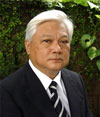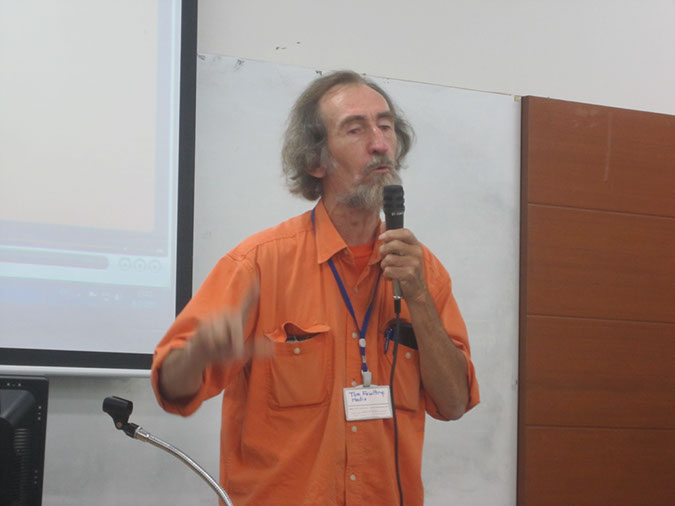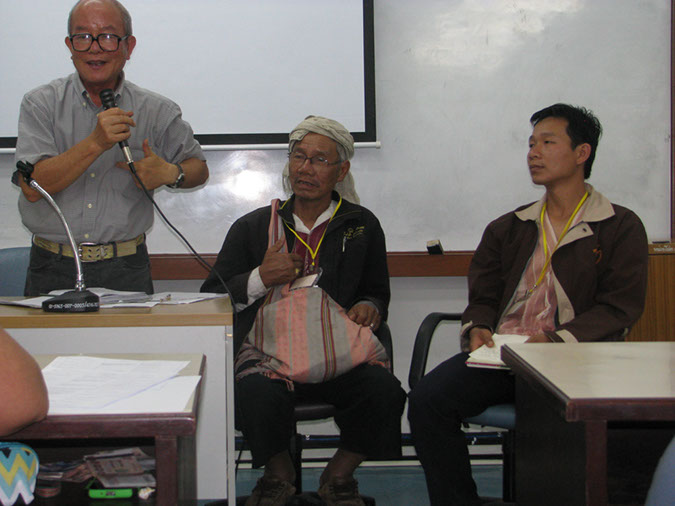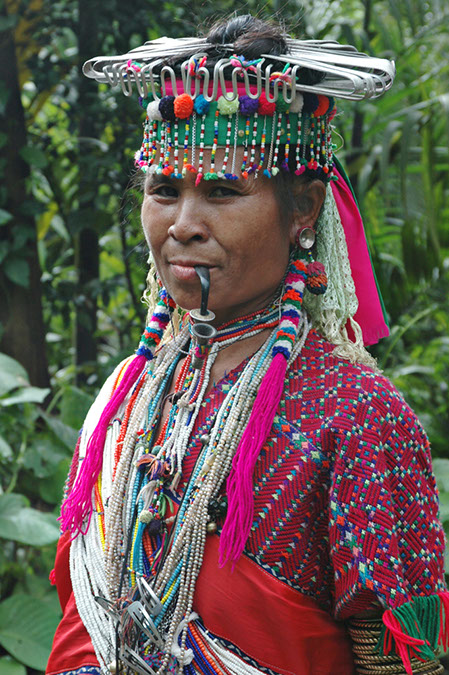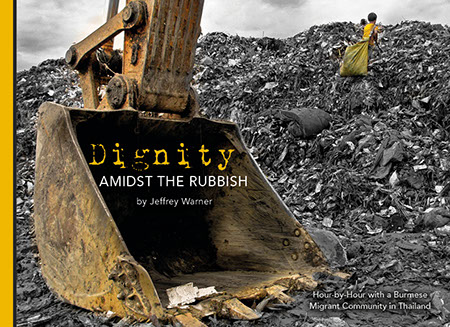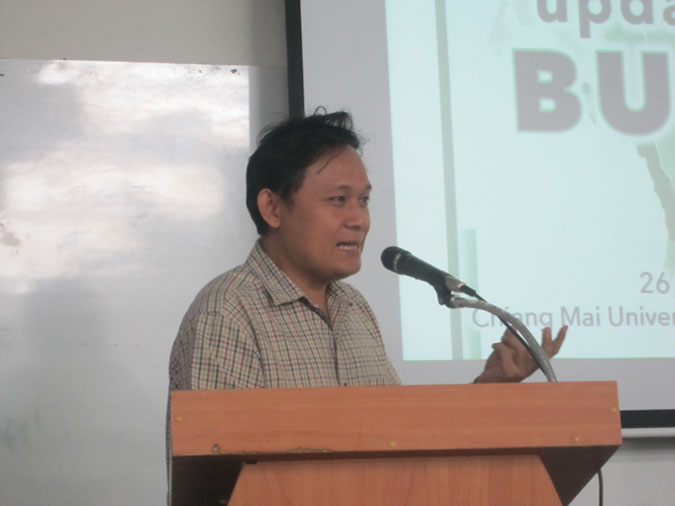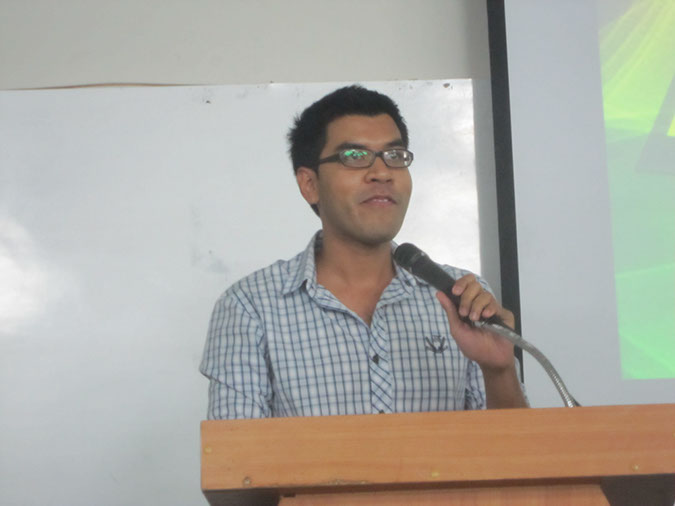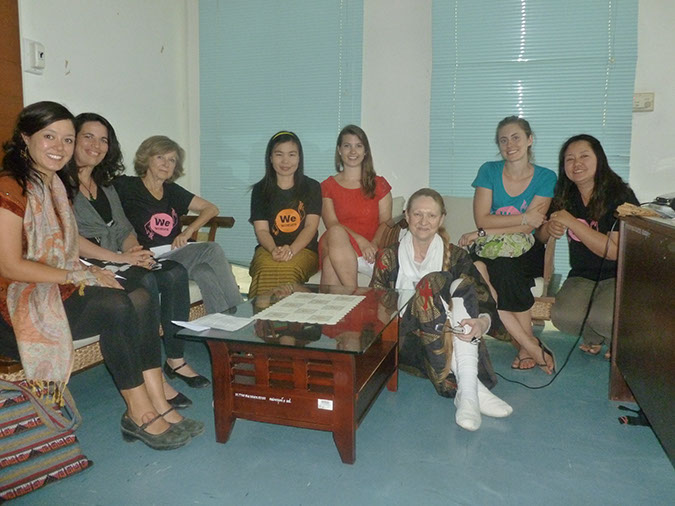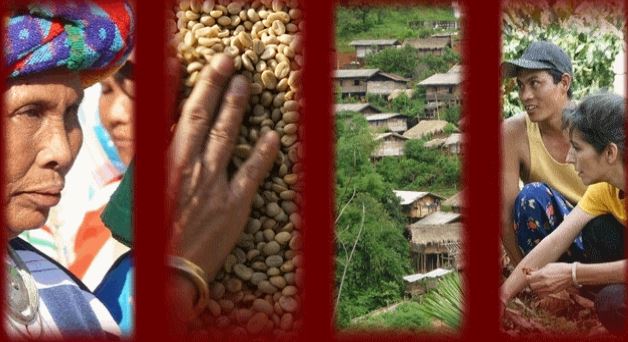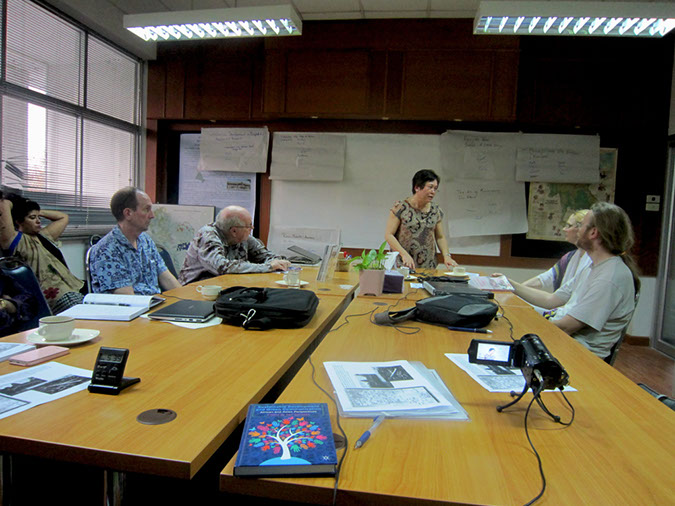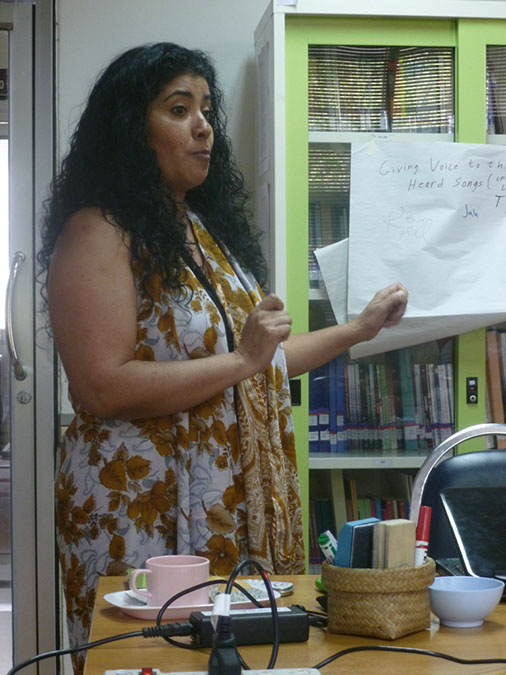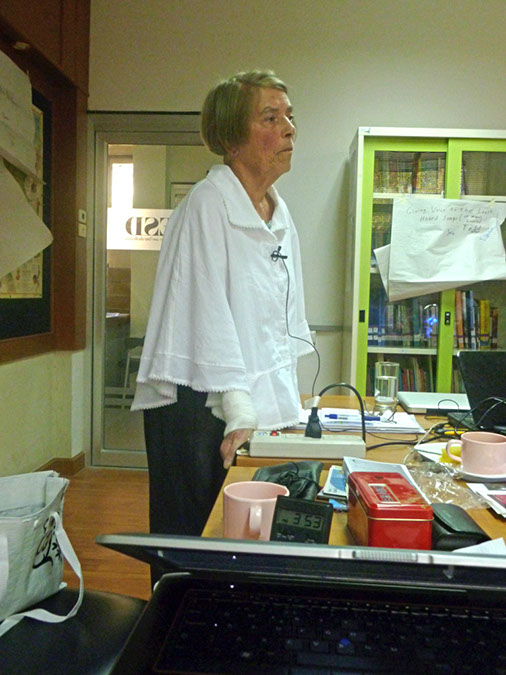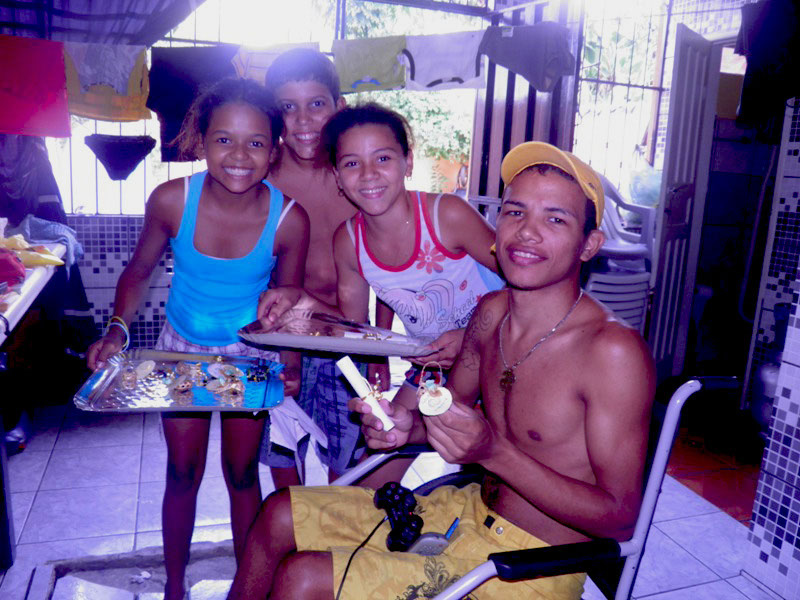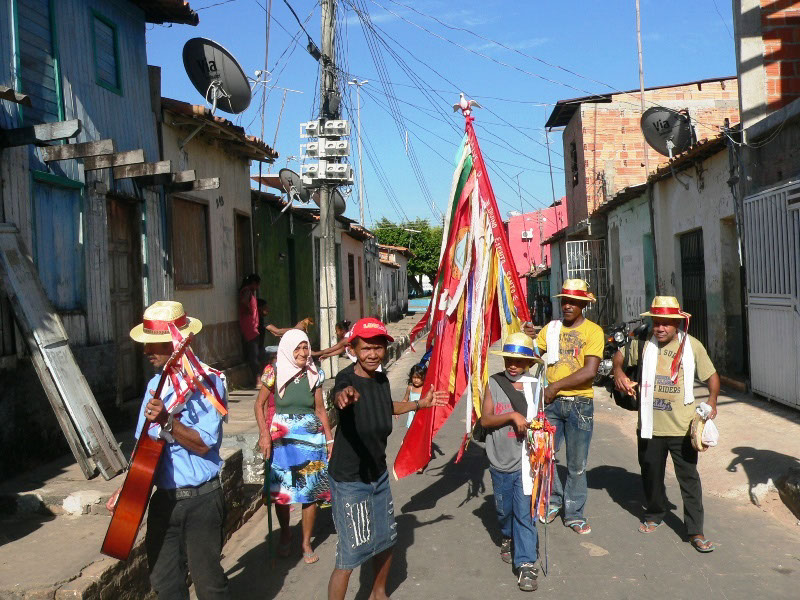23rd Annual Conference of Human Dignity and Humiliation Studies
'Returning Dignity'
in Chiang Mai, Thailand
8th - 12th March 2014
Please see Newsletter 23, written after this conference - you are warmly invited to contribute to it!
See also the Proclamation on Rural Resilience that we sent off to the United Nations after our visit to the Karen village Ban Nong Tao
To participate in our future conferences, please email us!
Chiang Mai University
Faculty of Social Sciences
Regional Center for Social Science and Sustainable Development (RSCD)
Faculty of Social Sciences
Center of Ethnic Studies and Development (CESD)
in connection with
Journal of Urban Culture Research
and with NGOs and individual activists for minority and refugee rights in border areas
(2014 is the last year for the UN Decade of Indigenous Peoples), in cooperation with the World Dignity University initiative
Local Hosts, Organisers, and Conveners
Chayan Vaddhanaphuti
Professor and Director of the Regional Center for Social Science and Sustainable Development (RSCD) and the Center of Ethnic Studies and Development (CESD) at the Faculty of Social Sciences, Chiang Mai University
We would like to express our profound gratitude also to Victoria Vorreiter and Khun Chanida Puranapun for their immesurable support!
Kjell Skyllstad
Visiting Professor at the Faculty of Fine and Applied Arts at Chulalongkorn University, Bangkok, Chief Editor of the Journal of Urban Culture Studies
• Please see Newsletter 23, written after this conference - you are warmly invited to contribute to it! To participate in our conferences, please email us!
• See here the programme of the entire conference, as well as the Public Event poster, and the Myanmar poster
• If you wished to participate, you could send an email to rcsd@cmu.ac.th, and copy your message to conferences@humiliationstudies.org
• There is no registration fee for our conferences. To cover our expenses, we always summarise the costs during the conference and invite participants to contribute according to their ability. This collaborative approach to financing allows us to keep the conference affordable for all.
• See here a Appreciative Introduction template for participants to fill in, print out, and bring to our conference: Word / Pdf
• See your first invitation and see the updated schedule further down or here• The areas that were suggested for discussion prior to the conference:
• The ever growing problem of water and land grabbing disregarding traditional land and water rights, including the damming of rivers to the detriment of water flow and fisheries, driving people from their traditional settlements
• The ever diminishing life space for minorities and refugees
• The increasing threats to indigenous learning, traditions and culture
• The gender inequality and ingrained traditions of family violence, male dominance, etc.
• Our inability to effectively deal with humiliating living conditions in our growing urban sprawls
• How you could get to the conference venue
You were invited to come to Chiang Mai in Thailand, either by bus or by plane. If you chose to fly in, the airport is about 15 minutes from the campus. Participants could take taxi from the airport to the hotel or use a hotel van. From the hotel to the campus, the Chiang Mai University kindly arranged transportation to come to the conference.
• Where you could stay
In all our conferences, attendees are kindly asked to make their own reservations. In this conference, we recommended option 1 (Sinthana Resort) because most of us stayed there
• Sinthana Resort (at the back gate of the university), 165-166 Suthep Road (Soi Wat Umong), Tambon Suthep, Mueang District, Chiang Mai 50200 (at the back gate of Chiang Mai University),
room rate: 800.- THB (standard) and 900.- THB (deluxe) with breakfast
• Sa-Nguan Malee Mansion (at the back gate of the university), 145 Moo 14, Soi Suthep 7, Suthep Road, Tambon Suthep, Mueang Distrrict, Chiang Mai 50200 (at the back gate of Chiang Mai Unviersity), room rate: 500.-THB (standard) and 600.-THB (deluxe) without breakfast (There is 24-hour convenient store, where you can by light food/snack, next to the mansion)
• UNISERV (the University Hostel), Location: Opposite CMU Auditorium, room rate: 500.-THB (rooms on the 1st – 2nd Floors) / 550.-THB (rooms on the 3rd – 4th Floors); breakfast will be charged at 80.-THB/person, note: according to the information based on 21 Feb. 2014, there are about 3 rooms left in this place
• Malin Residence (at the front gate of the university), on Huay Kaew Road, room rate:550.-THB (without breakfast) and 650.- THB (with breakfast), note: this place may be a little noisy as it is surrounded by the night market; but it is convenient for transportation and finding restaurant
• Green Palace Hotel (on Nimmanhemin Road – the shopping area), on Nimmanhemin Road, room rate: 480.-THB; breakfast will be charged at 85.-THB/person
• Meals
The Chiang Mai University organisers generously arranged for lunch to be prepared for us. Participants were kindly asked to pay for their food. Otherwise, for dinner, there was the Sunday Walking Street Market and the Night Market. Otherwise, Chiang Mai has many wonderful restaurants!
• Transportation
The Faculty's van picked the participants up from Sinthana Resort Hotel and brought them to the conference venue, bringing them back to the hotel on Saturday and Sunday 8th and 9th, and on Wednesday, 12th March.
Otherwise, you could always take a
Song Tao (inexpensive red truck) for up to 10 people or a Tuk-tuk for 2 or 3 people. For evening excursions, transportation was kindly arranged in advance.
• Post-conference experiences
Chiangmai is surrounded by tribal communities that call on our interest and solidarity in their fight for full citizen rights. Those wishing to stay longer in Chiang Mai to learn more about human rights issues in the area were welcome to visit the Pgak' Nyau (Karen) village Ban Nong Tao in the Mae-Win Subdistrict, Mae Wang District, Chiang Mai, Northern Thailand. Another possibility would have been Mae Hong Son and the refugee camps at the Thai-Burma border. Victoria Vorreiter and Jeffrey Warner knew about more possibilities. Of course visiting the golden temple on Doi Suthep high above the city is always a once in a life time experience.
• Green conference
We strive to organise our conferences as "Green Conferences". Lynn King kindly advises us.
• Please kindly note that...
• We like to get to know participants prior to our conferences and workshops, and prior to issuing an invitation.
• All our gatherings are by invitation only, please approach us so that we can include you and register you.
Only our Public Events are open to everybody without registration.
• The Non-Public Parts of our gatherings have limited enrollment.
• Participants are encouraged to find their own sources of funding or economic support to participate in our conferences. We offer our nurturing work as our gift of love and care to you, and we
would like to lovingly invite everybody to contribute to this gift economy. If you need funding for your travels and housing, please inquire in your country and your university about possibilities. See, among others, for the US, www.supportcenter.org and www.foundationscenter.org. The Weinstein International Fellowship program, inaugurated in 2008, provides opportunities for individuals from outside the United States to visit the U.S. to learn more about dispute resolution processes and practices and to pursue a project of their own design that serves to advance the resolution of disputes in their home countries.
• Participants in our conferences are kindly asked to handle all of their travel arrangements and required documentation, including requests for visas, on their side. HumanDHS is a volunteer initiative and does not have the staff or resources to assist with visa requests.
• Permissions
During our conferences, we always ask all participants for their permission to have their pictures or videos posted on our website, however, if you change your mind later, either in total or for specific pictures/videos, please let us know! Thank you! Since we wish to walk the talk of dignity, it is very important for us to do our utmost in respecting everybody's privacy. We refrain from gathering written permissions from you during our conferences, since we value the building of mutual trust in relationships, and we also would like to refrain from contributing to an ever more bureaucratic and legalistic society.
• What happened in our previous conferences?
Please have a look at all our previous conferences and the newsletters written after these conferences.
• Frame
• List of Conveners
• Programme
• List of Participants
• Papers
• Pictures and videos
Still pictures:
• Day One, 8th March 2014: see the photos taken by Donna Fujimoto, Marie Ingand, and Trine Eklund
• Day Two, 9th March 2014: see the photos taken by Trine Eklund, Donna Fujimoto, Cornelia Dragusin and Evelin Lindner with Evelin's camera, and by Marie Ingand
• Day Three and Four, 10th - 11th March 2014: see the photos taken by Donna Fujimoto, Evelin Lindner, Marie Ingand, and Trine Eklund
• Day Four, 11th March 2014: see the photos taken by Donna Fujimoto, and Evelin Lindner
• See also our Dignilogue Themes and our Appreciative Introductions
• Day Five, 12th March 2014: see the photos taken by Donna Fujimoto, and Evelin Lindner
• Day Six and Seven, Post-conference, 13th - 14th March 2014: see the photos taken by Evelin Lindner, and Trine Eklund
Videos:
Day One, 8th March 2014
• 01 Introduction by Kjell Skyllstad and Evelin Lindner, and Presentation of Participants
Presentations by Thai NGOs and local filmmakers:
• 02 Overview of Ethnic and Indigenous Human Rights in Asia, by Bernice Aquino See, Asian Indigenous Peoples Pact (AIPP)
• 03 Film Presentation: Killing the Mekong, Dam by Dam, by Tom Fawthrop, see Trailer
• 04 Special Talk: A Voice from Indigenous People, by Joni Odochaw, a Karen Sage and Former Village Headman from the Karen Village Ban Nong Thao
Day Two, 9th March 2014: 'Burma's Transition: Reforms, Ethnic Groups, and Ceasefires'
• 05 Update from Burma: An Overview of Changes, 2010-2014, by Garrett Kostin (Burma Study Center)
• 06 Guns, Briefcases, and Inequality: The Neglected War in Kachin State + Prospects for Peace and National Reconciliation in Burma/Myanmar, by Alex James (Burma Partnership)
• 07 Dignity Amidst The Rubbish: A Burmese Migrant Community in Thailand, by Jeffrey Warner, photojournalist
• 08 Nothing About Us Without Us: Refugees, Repatriation, and Representation, by Saw Nay Kaw (Karen Environmental and Social Action Network, KESAN)
• 09 Rohingya in Transit: Human Trafficking and Statelessness, by Ekraj Sabu (International Institute of Peace Studies, Asian Muslim Network)
• 10 Emerging Women of Burma, by Ursula Cats, the founder of the We Women Foundation, together with her students and volunteers
Day Three and Four, at the Lahu village Suan Lahu, 10th - 11th March 2014
• 11 Arrival and Welcome by Carina zur Strassen, recorded by Jeffrey Warner, 10th March 2014
• 12 At the Learning Center with Evelin Lindner, recorded by Mark Petz, 10th March 2014
• 13 At the Learning Center with Carina zur Strassen, recorded by Donna Fujimoto, 10th March 2014
• 14 At the Learning Center, Interview with Carina zur Strassen and Evelin Lindner, recorded by Donna Fujimoto, 10th March 2014
• 15 Interview with Laew, Mark Petz, and Carina zur Strassen, recorded by Donna Fujimoto, 11th March 2014
• 16 Coffee Processing, recorded by Jeffrey Warner, 11th March 2014
• 17 Village Impressions, recorded by Jeffrey Warner, 11th March 2014
• Carina zur Strassen later drew our attention to the film Landfill Harmonic Amazing and Inspirational, The "Landfill Harmonic" (Landfill harmonic - La armonía del vertedero - Orquesta de Instrumentos Reciclados de Cateura), an orchestra for kids with instruments made from trash, published on 29 Dec 2012.
Day Four, 11th March 2014
• 18 Turning the Tide in Rural Thailand, by Kjell Skyllstad (see The Life University: Learning Institute For Everyone, LIFE)
• 19 Culture, Religion, and HIV/Aids in Thailand, by Patchanee Malikhao (see her book Sex in the Village. Culture, Religion and HIV/AIDS in Thailand (Penang-Chiang Mai: Southbound & Silkworm Publishers, 2011)
Day Five, 12th March 2014
• 20 Communication/Media for Sustainable Change/Development, by Jan Servaes
• 21 Sustainable Development in Bangladesh: Problem and Prospects, by Mohammad Abul Kalam Azad, see also a Pdf file
• 22 Deeyah Khan: Banaz: A Love Story
• 23 Mindfulness into Action: Protecting Minorities - A Case Study from the Rainforest in Ecuador, by Mariana Vergara, see the presentation also on the Global Mindfulness into Action platform and search that platform
• 24 The Art of Peacemaking: Innovative Approaches to Conflict Transformation and Violence, Particularly Violence Against Women, by Trine Eklund
• 25 Carina zur Strassen, with her background from Peru, shared a Spanish song
• 26 Giving Voice to the Least Heard Songs, by Todd Saurman
• 27 Global Dignity, by Evelin Lindner
• 28 Greetings from the Brazilian Amazon, by Dan Baron
- Dance and Returning Dignity: Raízes e Antenas (o processo) - Roots and Antennas (the process) (published on 12th February 2014)
- Festival Beleza Amazônica: Youth Leadership Through the Arts (published on 27th January 2014)
- Festival Beleza Amazônica (published on 4th November 2013)
Day Six and Seven, at Ban Nong Thao, a Pgak' Nyau (Karen) Village, Post-conference Excursion, 13th - 14th March 2014
• 29 Zwae Siwakom Odochao and Otzie (or Chindanai Jowaloo, or also Chai) Present Their Pgak' Nyau Village Ban Nong Thao in Northern Thailand (at 1200 Meters Height) on 13th March 2014, see the long version of one hour or part 1 | part 2 | part 3
• 30 An Elder Speaks: Joni Odochaw, Karen Sage and Former Village Headman from Ban Nong Thao, in Conversation with Mariana Vergara, Sharing the Voice of the Indigenous Peoples from South America, 13th March 2014 (we apologise that the conversation ends abruptly, due to technical problems)
• 31 Clothing Traditions: Joni Odochaw, His Wife, His Son Zwae, Together with His Cousin Otzie and His Mother, 14th March 2014
• 32 Vision for the Future: Joni Odochaw, His Son Zwae, and His Cousin Otzie Speak about the Karen Vision of Life, 14th March 2014
• 33 The Lazy School's First Student Peter Dering, 14th March 2014
Videos created by Linda Hartling:
• Greetings to All (short version), created on 16h April 2013 for our 2013 South Africa Conference
• Greetings to All (long version), created on 16h April 2013 for our 2013 South Africa Conference
• Appreciative Enquiry, a video recorded on October 30, 2011, in Portland, Oregon, USA, for the World Dignity University initiative
• Welcome to Everybody, created on 12th August 2012 for our 2012 Norway Conference
• Our Appreciative Frame, created on 12th August 2012 for our 2012 Norway Conference
• Our Open Space Dignilogue Format, created on 12th August 2012 for our 2012 Norway Conference
• What happened in our previous meetings? Please see Newsletters!
Frame
by Linda Hartling, 2004
In our meetings we aim at creating a humiliation-free, collaborative learning environment characterised by mutual respect, mutual empathy, and openness to difference. The perspective of 'appreciative enquiry' is a useful frame of our work. Our HumanDHS efforts are not just about the work we do together, but also about HOW WE WORK TOGETHER. At appropriate points during our meetings, for example at the end of each day, we take a moment to reflect on the practices observed that contributed to an appreciative/humiliation-free learning experience.
It is important to emphasise that an appreciative approach is not about expecting people to agree. In fact, differences of opinion enrich the conversation and deepen people's understanding of ideas. Perhaps, this could be conceptualised as 'waging good conflict' (Jean Baker Miller), which means practicing radical respect for differences and being open to a variety of perspectives and engaging others without contempt or rankism. As we have seen in many fields, contempt and rankism drain energy away from the important work that needs to be done. Most people only know 'conflict' as a form of war within a win/lose frame. 'Waging good conflict', on the other side, is about being empathic and respectful, making room for authenticity, creating clarity, and growth.
Please see:
• An Appreciative Frame: Beginning a Dialogue on Human Dignity and Humiliation, written by Linda in 2005
• Appreciative Facilitation: Hints for Round Table Moderators, kindly written in February 2006 by Judith Thompson to support the moderators of our workshops.
• Buddhist Teachings on Right Speech, kindly provided to us by Thomas Daffern in 2006, relating to our quest for appreciative enquiry, caring and being.
• Linda Hartling: Presenting the Frame of Appreciative Enquiry
Appreciative Enquiry is an approach to global collaboration developed by and for the Human Dignity and Humiliation Studies network and the World Dignity University. This video was uploaded onto YouTube on August 4, 2012, in preparation of the 19th Annual Conference of Human Dignity and Humiliation Studies, 27th-30th August 2012, in Oslo, Norway.
List of Conveners
Evelin Gerda Lindner, Medical Doctor, Clinical and Social Psychologist, Ph.D. (Dr. med.), Ph.D. (Dr. psychol.), Organiser of the HumanDHS Conferences, Supporting the Local Conveners
Evelin Gerda Lindner is the Founding President of the Human Dignity and Humiliation Studies (HumanDHS) network and initiator of the World Dignity University initiative. She is a transdisciplinary social scientist and humanist who holds two Ph.D.s, one in medicine and one in psychology. In 1996, she designed a research project on the concept of humiliation and its role in genocide and war. German history served as starting point. She is the recipient of the 2006 SBAP Award and 2009 'Prisoner’s Testament' Peace Award. She is affiliated with the University of Oslo, Norway, with its Centre for Gender Research, and with its Department of Psychology (folk.uio.no/evelinl/), furthermore, with the Columbia University Conflict Resolution Network (CU-CRN), which was superseded, in 2009, by the Advanced Consortium on Cooperation, Conflict, and Complexity (AC4) at Columbia University, New York. She is also affiliated with the Maison des Sciences de l'Homme in Paris. Lindner is teaching globally, including in South East Asia, the Middle East, Australia, Africa, and other places globally. [read more]
Linda Hartling, Ph.D., Social Psychologist, Organiser of the HumanDHS Conferences, Supporting the Local Conveners
Dr. Linda M. Hartling is the Director of Human Dignity and Humiliation Studies (HumanDHS). She is also a Member of the HumanDHS Global Advisory Board, HumanDHS Global Core Team, HumanDHS Global Coordinating Team, HumanDHS Research Team, and HumanDHS Education Team. She is the Editor of the Journal of Human Dignity and Humiliation Studies (JHDHS).
Hartling is affiliated with the Jean Baker Miller Training Institute (JBMTI) at the Stone Center, which is part of the Wellesley Centers for Women at Wellesley College in Massachusetts.
Until November 2008, she was its Associate Director. Hartling is a member of the JBMTI theory-building group advancing the practice of the Relational-Cultural Theory, which is a new model of psychological development. In addition, Hartling coordinates and contributes to training programs, publications, and special projects for the JBMTI. She holds a doctoral degree in clinical/community psychology and has published papers on resilience, substance abuse prevention, shame and humiliation, relational practice in the workplace, and Relational-Cultural Theory. [read more]
Please see:
• Humiliation: Real Pain, A Pathway to Violence, the draft of Linda's paper for Round Table 2 of our 2005 Workshop on Humiliation and Violent Conflict, Columbia University, New York.
• Humiliation: Assessing the Impact of Derision, Degradation, and Debasement, first published in The Journal of Primary Prevention, 19(4): 259-278, co-authored with T. Luchetta, 1999.
• Shame and Humiliation: From Isolation to Relational Transformation, the Jean Baker Miller Training Institute (JBMIT), Wellesley Centers for Women, Wellesley College No. 88, Wellesley, MA 02481, co-authored with Wendy Rosen, Maureen Walker, Judith V. Jordan, 2000.
• Humiliation and Assistance: Telling the Truth About Power, Telling a New Story, paper prepared for the 5th Annual Conference of Human Dignity and Humiliation Studies 'Beyond Humiliation: Encouraging Human Dignity in the Lives and Work of All People', in Berlin, 15th -17th September, 2005.
Chayan Vaddhanaphut, Host, Organiser, and Convener
Dr. Chayan Vaddhanaphuti is Professor and Director of the Regional Center for Social Science and Sustainable Development (RCSD) and of the Center for Ethnic Studies and Development (CESD) at the Faculty of Social Sciences (CMU) in Northern Thailand. He is an anthropologist who earned his Ph.D. from Stanford University in 1984 and received an Honorary Doctorate in Social Anthropology from Göteborg University, Sweden, in 2004. He has edited numerous books, including recently, Transcending State Boundaries (2011).
Kjell Skyllstad, Host, Organiser, and Convener
Kjell Skyllstad is on the Faculty of Fine and Applied Arts at Chulalongkorn University in Bangkok, Thailand, since 2009. Kjell Skyllstad is also Professor Emeritus at the Department of Musicology (Institutt for musikkvitenskap) at the University of Oslo in Norway. He is Member of the Executive Committee of the International Society for the Study of European Ideas (ISSEI). [...]
Kjell Skyllstad has done research on the history of racism in a cultural perspective and on the effect of a multicultural school music program on the prevention of racial conflict. [read more]
Conference Programme
Day One, Public Event, Saturday, 8th March 2014
8th March is Women's Day!
Chiang Mai University, Faculty of Humanities, Eighth Floor of HB7, HB 7802
(one classroom and large exhibition space for two exhibitions, see map 1, and map_2)

• Please click here to see more photos of the entire day taken by Donna Fujimoto
• Please click here to see more photos of the entire day taken by Marie Ingand
• Please click here to see more photos of the entire day taken by Trine Eklund
9.00 - 9.30 Introduction by Kjell Skyllstad and Evelin Lindner

• Please click here to see more photos of the entire day taken by Donna Fujimoto
• Please click here to see more photos of the entire day taken by Marie Ingand
• Please click here to see more photos of the entire day taken by Trine Eklund
Kjell Skyllstad shared these preliminary reflections already on 26th February 2014: March 8 is Womens Day. That is why I suggested beginning our conference on that day. We should focus on womens' dignity. The whole conference is designed to be part of the last year of UN Decade for Indigenous Peoples and the UN Decade for Sustainable Development. We wish to tie the conference to all Decade aims and resolutions.
I am deeply appreciative that Chayan Vaddhanaphuti agreed to take on our conference as representative of the CMU institutes for Sustainable Development and Minorities with a possibility to focus on the connection between the two as a necessary preparation for the 2015 implementation of the ASEAN union. It is a question of what development will mean for our nations. Will it mean discarding the sustainability that has been underlying the survival of tribal communities for centuries and abandoning ourselves to an uninhibited market economy driven by a profit hungry corporate world. Norway has a special responsibility to reconnect to the Brundtland report and give new meaning, that is to restore the tribal meaning of the concept of sustainable development used and misused throughout the world. This has been my field of serious concern for decades from the time I humbly did my first studies in SEA communities.
This is a major event to discuss the fate of ASEAN in light of environmental, human rights and minority issues. There must be partcipation by our members and a major roundtable with a resolution.
At the conference I will represent myself and Association for International Water Studies (FIVAS) that I started 25 years ago, now a member of Save the Mekong coalition and internationally active as always.
The other contributors of this conference, local and international, have huge reservoirs of wisdom and inventiveness. So this is not just another conference. Our participants are free to share their insights and experiences with activists in the field, not least those whose voices need to be heard!
9.30 - 10.30 Participants presented themselves
Presentations by Thai NGOs and local filmmakers
• 10.30 – 12.00 Overview of Ethnic and Indigenous Human Rights in Asia, by Bernice Aquino See, Asian Indigenous Peoples Pact (AIPP)
• See the video
• Please click here to see more photos of the entire day taken by Donna Fujimoto
• Please click here to see more photos of the entire day taken by Marie Ingand
• Please click here to see more photos of the entire day taken by Trine Eklund12.00 – 1.30 Lunch
• 13:30 – 3:00 Film Presentation: Killing the Mekong, Dam by Dam, by Tom Fawthrop, see Trailer
• Please click here to see more photos of the entire day taken by Donna Fujimoto
• Please click here to see more photos of the entire day taken by Marie Ingand
• Please click here to see more photos of the entire day taken by Trine Eklund• 15:00 –16:30 Special Talk: A Voice from Indigenous People, by Joni Odochaw, a Karen sage and former village headman from the Karen village Ban Nong Thao
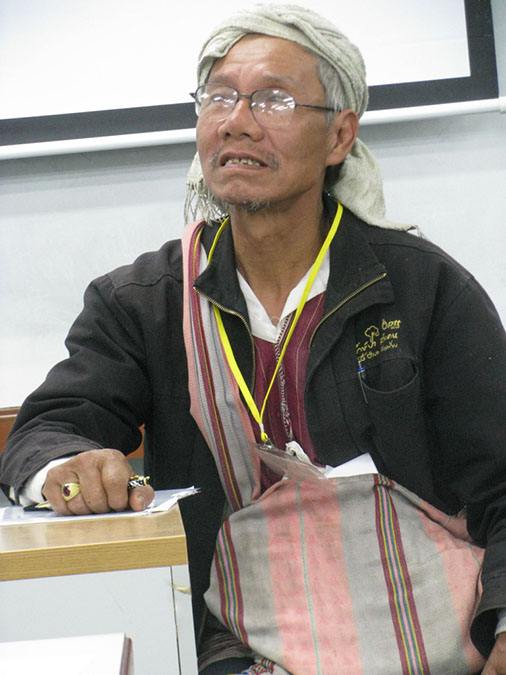
• See the video
• Please click here to see more photos of the entire day taken by Donna Fujimoto
• Please click here to see more photos of the entire day taken by Marie Ingand
• Please click here to see more photos of the entire day taken by Trine Eklund• 16:30 – 17:30 Curator Walk: 'Majesty in the Mountains', by Victoria Vorreiter
Dinner at the Galae Restaurant, 65 Suthep Road, Chiang Mai, Telephone: 053 – 328 – 455

• Please click here to see more photos of the entire day taken by Donna Fujimoto
• Please click here to see more photos of the entire day taken by Marie Ingand
• Please click here to see more photos of the entire day taken by Trine Eklund
Pauline Erera kindly informed us of a local event in Chiang Mai celebrating Women's Day on March 8. It's taking place in the Suan Bauk Haad Municipal Garden (south west corner of the moat), which was established in 2006 for women to come together on the Women International Day.
End of Day One of the Public Event
Exhibitions in the Foyer of the Conference Room
• Exhibition of Photos and Artifacts: Majesty in the Mountains: Traditional Culture of the Highland Peoples of Southeast Asia, by Victoria Vorreiter
To accompany its 23rd Annual Conference, 'Returning Dignity', the Human Dignity and Humiliation Studies Program is pleased to host 'Majesty in the Mountains: Traditional Culture of the Highland Peoples of Southeast Asia'. This display of photographs and artifacts offers a glimpse at the lives and ancestral practices of the Karen, Hmong, Mien, Lahu, Lisu, and Akha, the primary groups found at the crossroads of Myanmar, Laos, Thailand, and China. Gathered over many years by Chiang Mai-based photographer and researcher Victoria Vorreiter, it is hoped that these collections demonstrate the timeless beauty, integrity, and wisdom embodied by these traditional cultures. Please see www.TribalMusicAsia.com

'Majesty in the Mountains: Traditional Culture of the Highland Peoples of Southeast Asia'
Exhibition of Photos and Artifacts by Victoria Vorreiter, see www.TribalMusicAsia.com
Please click on the pictures or here to see more photos• Exhibition: Dignity Amidst the Rubbish, by Jeffrey Warner
1. Dignity Amidst The Rubbish: Hour-by-Hour With a Burmese Migrant Community in Thailand Dignity Amidst The Rubbish is a close look into the daily lives of a community of refugees from Burma living on a rubbish dump on the outskirts of Mae Sot, Thailand -- just a stone's throw from the Burmese border. Photos and prose provide a glimpse into the situations of these individuals and their families: first, the daily activities of the dump community, hour-by-hour. The lens of the author offers a unique perspective revealing insight into aspects of the human condition and behavior to which we all can relate. Expanding on this, the powerful influence of environment is explored before those living at this dump express themselves in their own words. Then, sentiments from members of the general public lead into what this work is about at its core, which is a global issue related to the larger condition of humankind at this moment in time. Finally, the question we must ask ourselves: What can we do?
2. Indigenous Voices: Glimpses Into the Margins of Modern Development
'Indigenous Voices' is a journey that provides glimpses into nine ethnic villages located in the mountains of North Thailand, each at varying degrees of modern development. This photo essay-project provides exposure to village life while attempting to detach from a modern world environment and relish real Thailand, which is nature, while acclimating to and learning about highland village life and how its being effected by outside influences.

Day Two, Public Event, Sunday, 9th March 2014 'Burma's Transition: Reforms, Ethnic Groups, and Ceasefires'
Chiang Mai University, Faculty of Humanities, Eighth Floor of HB7, HB 7802
(one classroom and large exhibition space for two exhibitions, see map 1, and map_2)
9:00–9:05 Welcome by Dr. Chayan Vaddhanaphuti
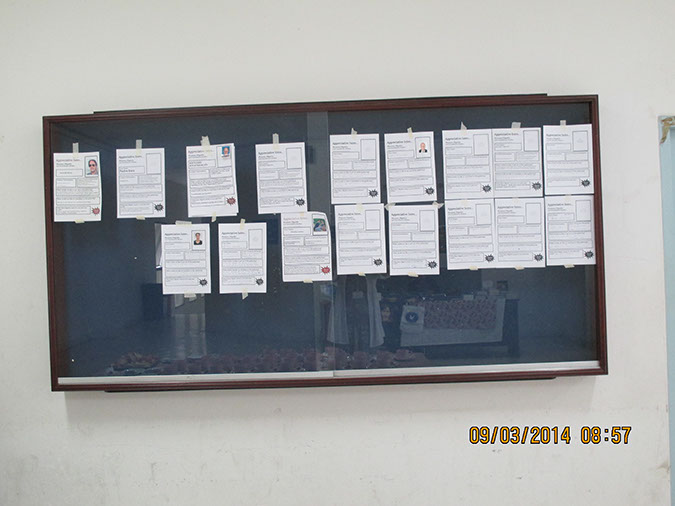
We displayed all Appreciative Introductions on the wall of the foyer of the conference room. What you see here is the situation as it was on 9th March. We are very thankful to Marie Ingand and her daughter Sofie for being the guardians and nurturers of this process. They kindly invited our conference participants to share their introductions on the wall. Please click here to see more photos taken by Marie Ingand. We thank Khun Chanida Puranapun for scanning in the Introductions and making a Pdf file for us.
'Burma's Transition: Reforms, Ethnic Groups, and Ceasefires'
• 9.05–10.20 Update from Burma: An Overview of Changes, 2010-2014, by Garrett Kostin, Burma Study Center
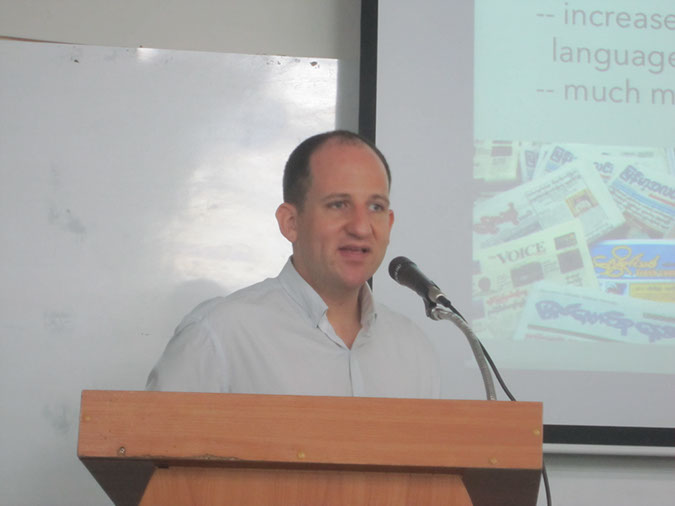
• Please see the video
• Please click here to see more photos of the entire day taken by Donna Fujimoto
• Please click here to see more photos of the entire day taken by Cornelia Dragusin and Evelin Lindner with Evelin's camera
• Please click here to see more photos of the entire day taken by Marie Ingand
• Please click here to see more photos of the entire day taken by Trine Eklund
10.20–10.35 Coffee break
• 10.35–11.45 Guns, Briefcases, and Inequality: The Neglected War in Kachin State + Prospects for Peace and National Reconciliation in Burma/Myanmar, by Alex James, Burma Partnership
• Please see the video
• Please click here to see more photos of the entire day taken by Donna Fujimoto
• Please click here to see more photos of the entire day taken by Cornelia Dragusin and Evelin Lindner with Evelin's camera
• Please click here to see more photos of the entire day taken by Marie Ingand
• Please click here to see more photos of the entire day taken by Trine Eklund
• 11.50–12.20 Dignity Amidst The Rubbish: A Burmese Migrant Community in Thailand, by Jeffrey Warner, photojournalist
• Please see the video
• Please click here to see more photos of the entire day taken by Donna Fujimoto
• Please click here to see more photos of the entire day taken by Cornelia Dragusin and Evelin Lindner with Evelin's camera
• Please click here to see more photos of the entire day taken by Marie Ingand
• Please click here to see more photos of the entire day taken by Trine Eklund
12.20–13.45 Lunch
• 13.45–14.45 Nothing About Us Without Us: Refugees, Repatriation, and Representation, by Saw Nay Kaw, Karen Environmental and Social Action Network, KESAN
• Please see the video
• Please click here to see more photos of the entire day taken by Donna Fujimoto
• Please click here to see more photos of the entire day taken by Cornelia Dragusin and Evelin Lindner with Evelin's camera
• Please click here to see more photos of the entire day taken by Marie Ingand
• Please click here to see more photos of the entire day taken by Trine Eklund
• 14.50–16.00 Rohingya in Transit: Human Trafficking and Statelessness, by Ekraj Sabu, International Institute of Peace Studies, Asian Muslim Network
• Please see the video
• Please click here to see more photos of the entire day taken by Donna Fujimoto
• Please click here to see more photos of the entire day taken by Cornelia Dragusin and Evelin Lindner with Evelin's camera
• Please click here to see more photos of the entire day taken by Marie Ingand
• Please click here to see more photos of the entire day taken by Trine Eklund
16.00–16.15 Coffee break
• 16.15–17.25 Emerging Women of Burma, by Ursula Cats, and her colleagues of the We Women Foundation
Ursula Cats is its founder, working with Cindy Wilkinson, and students and volunteers are Lawnt Ying, Mwe Nohng, Maya Hoffman, Anna Gordon, and others

• Please see the video
• Please click here to see more photos of the entire day taken by Donna Fujimoto
• Please click here to see more photos of the entire day taken by Cornelia Dragusin and Evelin Lindner with Evelin's camera
• Please click here to see more photos of the entire day taken by Marie Ingand
• Please click here to see more photos of the entire day taken by Trine Eklund
17.25–17.30 Concluding Remarks by Dr. Chayan Vaddhanaphuti
Note from 2021, German connections with Myanmar:
'Hilfe für die Junta: Deutsche Firmen machen Geschäfte in Myanmar und unterstützen so das Militärregime', by Nils Klawitter, Der Spiegel, 14, 3rd April 2021
End of Day Two of the Public Event
Day Three and Four, Full Day Excursion and Overnight Homestay in a Lahu Village, Monday and Tuesday, 10th - 11th March 2014
Hosted by Suan Lahu, Lahu Coffee and Culture in Northern Thailand, devoted to sustainable coffee farming and preserving Lahu culture, invited by Carina zur Strassen.
The cost for the field trip, including meals and overnight stay, was 1,500 Thai Baht per person. There was a small additional cost for the transport. Thank you!
Please see the videos:
• Arrival and Welcome by Carina zur Strassen, kindly recorded by Jeffrey Warner, 10th March 2014
• At the Learning Center with Evelin Lindner, kindly recorded by Mark Petz, 10th March 2014
• At the Learning Center with Carina zur Strassen, kindly recorded by Donna Fujimoto, 10th March 2014
• At the Learning Center, Interview with Carina zur Strassen and Evelin Lindner, kindly recorded by Donna Fujimoto, 10th March 2014
• Interview with Laew, Mark Petz, and Carina zur Strassen, kindly recorded by Donna Fujimoto, 11th March 2014
• Coffee Processing, kindly recorded by Jeffrey Warner, 11th March 2014
• Village Impressions, kindly recorded by Jeffrey Warner, 11th March 2014

Please see the still photos:
• Please
click here to see more photos of the entire excursion taken by Donna Fujimoto
• Please click here to see more photos of the entire excursion taken by Evelin Lindner
• Please click here to see more photos of the entire excursion taken by Marie Ingand
• Please click here to see more photos of the entire excursion taken by Trine Eklund
• Please click here to see more photos taken by Jeffrey Warner on 10-11th March 2014, and on two earlier visits in 2011 and 2012.
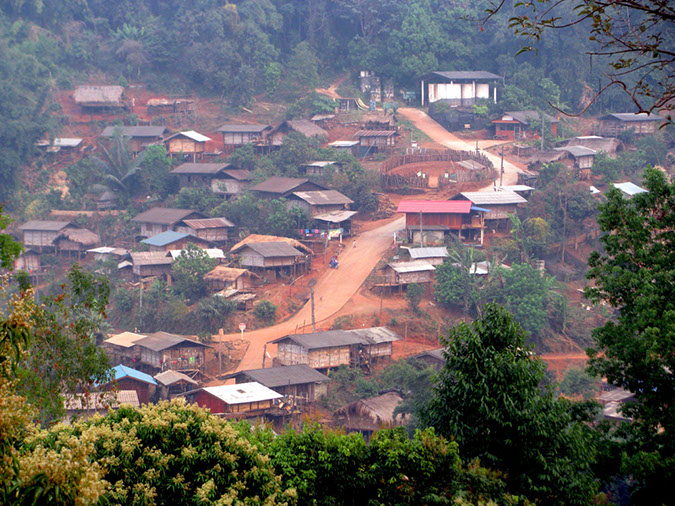
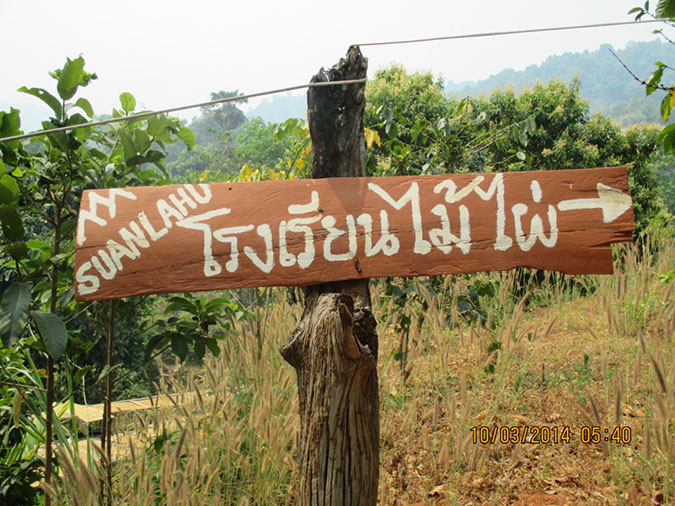
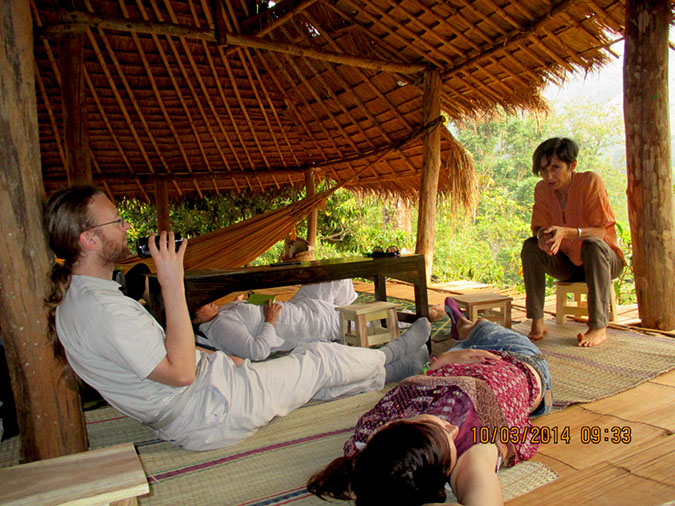
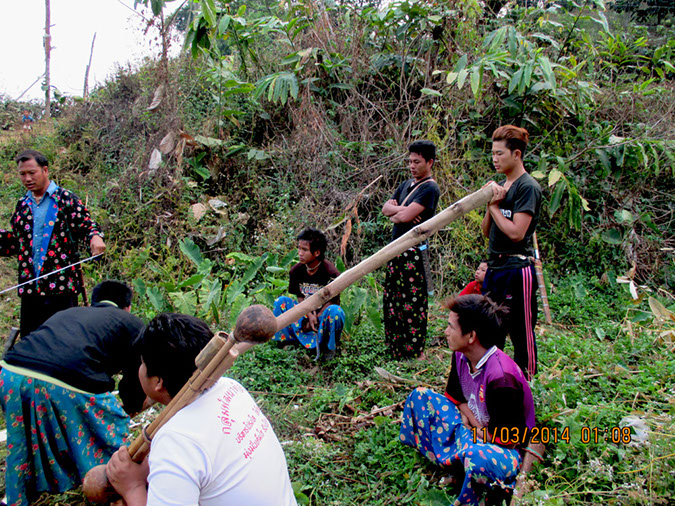
Please note the black tarps covering the landscape. Underneath is commercial flower agribusiness. Pesticides poison the farmers, and they are all in debt. In Carina's house, I found the famous poster depicting Native American leader Sitting Bull, quoting the Cree prophecy: 'When all the trees have been cut down, when all the animals have been hunted, when all the waters are polluted, when all the air is unsafe to breathe, only then will you discover you cannot eat money'.
• Carina zur Strassen later drew our attention to the film Landfill Harmonic - An Orchestra for Kids with Instruments Made from Trash (La armonía del vertedero - Orquesta de Instrumentos Reciclados de Cateura), published on 29 Dec 2012. A cello made from an oil can and pieces of wood, that were thrown in the garbage; a saxophone made of spoons and buttons. These instruments are crafted by Nicolas, a 'recycler' with no previous experience making musical instruments, who is living 'hand-to-mouth' by the garbage dump in Catuera, Paraguay. Inspired by this initiative and creativity, Maestro Luis Szaran, director of "Sounds of the Earth," formed the 'recycled orchestra,' with children living near the dump. "Our main goal isn't to form good musicians, but to form good citizens." Now 30 members strong, (and looking for more, for a full orchestra) listen to the sweet sounds of these 'recycled' instruments and the hopes and dreams of the children who play them. The "Creative Visions Foundation" inspires and supports creative activists -- individuals who use media and the arts to raise awareness of critical issues around the globe and ignite positive change. CVF provides tools, mentorship, resources and an linked community to help our activists harness the power of media, arts and technology to solve global problems in the areas of: human rights, environment, youth & education, woman empowerment, and global consciousness'.
Day Four, Worshop Part of this Conference, Tuesday, 11th March 2014
Chiang Mai University, Faculty of Social Sciences, Operations Building, The Meeting Room, 4th Floor (see map 1, and map_2)
Return in the morning to Chiang Mai (Sinthana Resort)
Free morning
Open arrangements for lunch
Welcome by Kjell Skyllstad and Evelin Lindner to the workshop part of our conference
Welcome by Chayan Vaddhanaphuti as Director of the Regional Center for Social Science and Sustainable Development, Faculty of Social Sciences, Chiang Mai University

• Please click here to see our Dignilogue themes (shared in the order displayed)
• Please click here to see more photos of the entire day taken by Donna Fujimoto
• Please click here to see more photos of the entire day taken by Evelin Lindner
Introductory presentation: The Appreciative Frame of this Conference (see also our Latest News)
Linda M. Hartling, Ph.D., Director of HumanDHS. Linda is also affiliated with the Jean Baker Miller Training Institute (JBMTI) at the Stone Center, which is part of the Wellesley Centers for Women at Wellesley College in Massachusetts. Until 2008, she was its Associate Director.
Evelin G. Lindner, Founding President of HumanDHS
This talk highlights how globalisation is interlinked with new and unprecedented psychological dynamics that call for novel solutions at all levels - macro, meso and micro levels, and in all fields of public policy.
Please see background material:
• A Dignity Economy: Creating an Economy that Serves Human Dignity and Preserves Our Planet, Evelin Lindner's fourth book, published by Dignity Press, 2012
• See introductory lectures given at the University of Oslo, Norway at www.sv.uio.no/tjenester/kunnskap/podkast/index.html (search for Lindner)
• Invitation into the World Dignity Initiative
Launch of Dignilogue Sessions
Introduction into the Dignilogue Format by Linda M. Hartling (created on 13th August 2012)
We have thought about how to dignify the way we conduct our conferences for many years. The Open Space movement has started from the observation that after mainstream academic conferences, the participants, when asked, often say: 'Oh, I slept through the presentations, but the coffee breaks were wonderful!' The creators of the Open Space approach thought: 'Ok, why don't we create conferences that are structured like coffee breaks!' Please read more about the originator of the Open Space Technology, Harrison Owen.
In other words, the basic idea behind the Open Space approach is that most academic conference are rather boring. Invited speakers might not be in tune with the audience. Reading papers aloud may be particularly uncommunicative.
We aim at co-creating our conferences, in contrast to traditional conferences. We take a highly collaborative approach to determining how to use our time. The Dignilogue approach allows for identifying priorities for dialogue sessions on key topics.
In practice, on Day One of our conference, we, the participants, make the programme for Day Two and Day Three together, in a collaborative effort. All participants are both presenters and audience, there is no separation, there is no pre-planned programme, except for the introductory part (and the Public Event). We are aware that this approach is new to most people, yet, it opens new dimensions. We invite every participant to join us and try. It has an profoundly dignifying impact and, as our participants always tell us afterwards.
We have adapted the Open Space approach, added the term dialogue, and connected it with dignity to form the expression Dignilogue (see also our Video page for how peace linguist Francisco Gomes de Matos has inspired this linguistic creation).
Please watch the Introduction into the Dignilogue Sessions Format by Linda M. Hartling (created on 13th August 2012). Please read here more about the Dignilogue format and what it entails. See also Open Space Tools by Peggy Holman.
The World Dignity University initiative (WDU) was launched in 2011. Like the HumanDHS network, it is a pro-bono initiative, aiming to nurture a dignity movement within education. We always invite our conference participants to support our WDU initiative, if they wish so. This can be done, for instance, by creating mini-videos of dialogues, please see our videos page for examples. Please note that we differ from traditional organisations, intitutes, or NGOs of whatever kind. Our work is a work of love. We have an almost zero budget. We refrain from 'empire' building. We also refrain from ' abusing' our conference participants to make 'propaganda' for our work. Videos do not have to go to the WDU site. They can be used in whatever other ways. Please note the way we work in our newsletter10.
These areas were suggested for discussion prior to the conference by Kjell Skyllstad:• The ever growing problem of water and land grabbing disregarding traditional land and water rights, including the damming of rivers to the detriment of water flow and fisheries, driving people from their traditional settlements
• The ever diminishing life space for minorities and refugees
• The increasing threats to indigenous learning, traditions and culture
• The gender inequality and ingrained traditions of family violence, male dominance, etc.
• Our inability to effectively deal with humiliating living conditions in our growing urban sprawls
Dignilogue Sessions
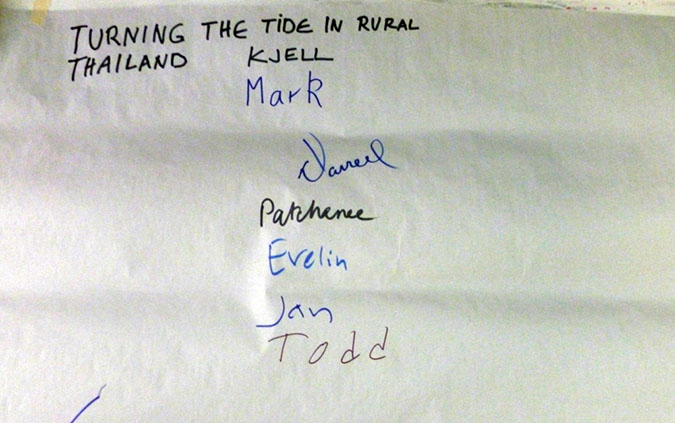
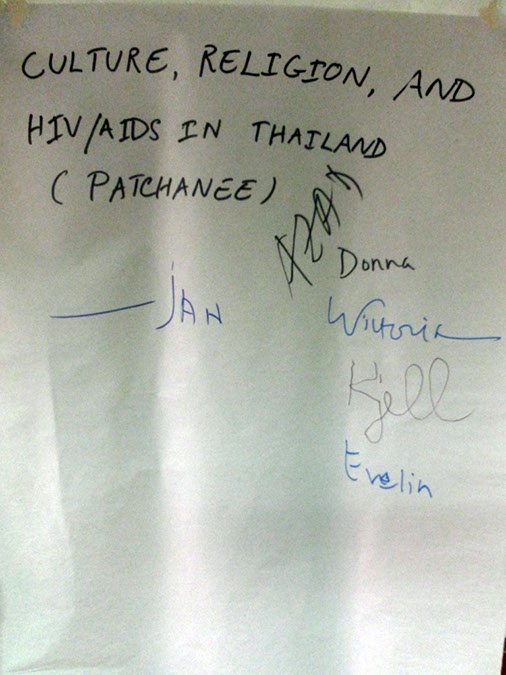
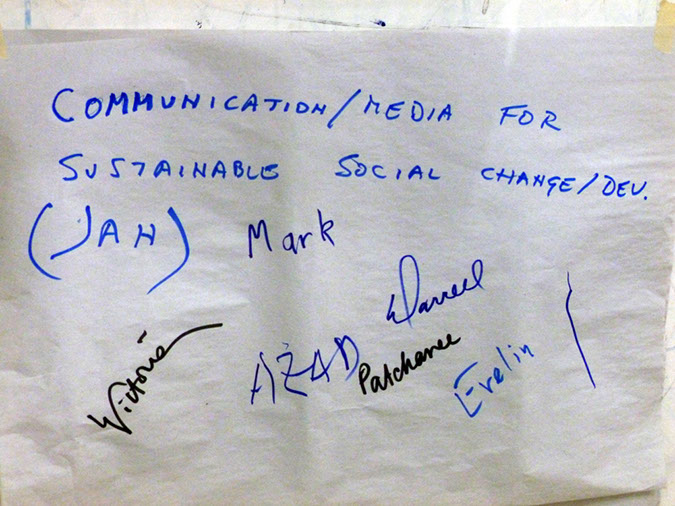
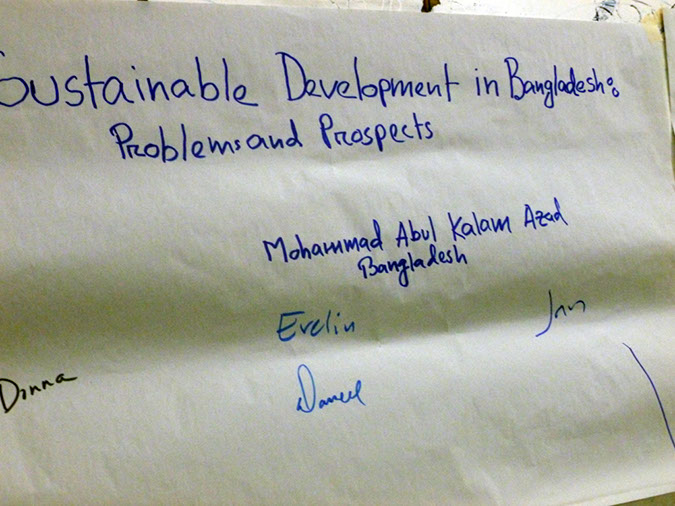
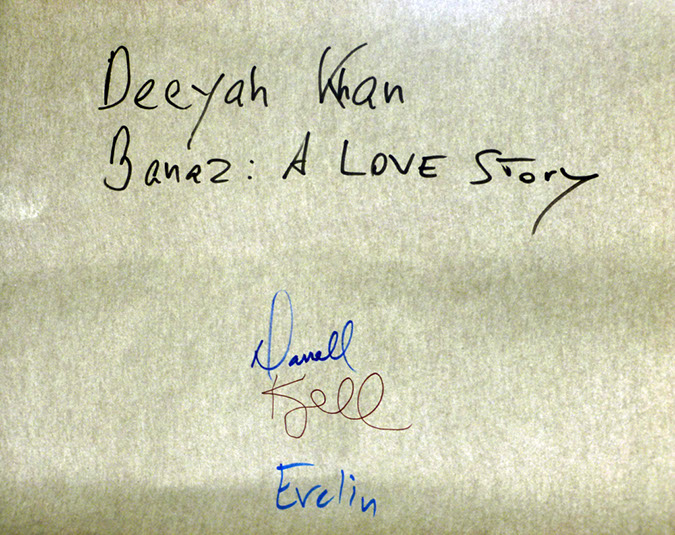
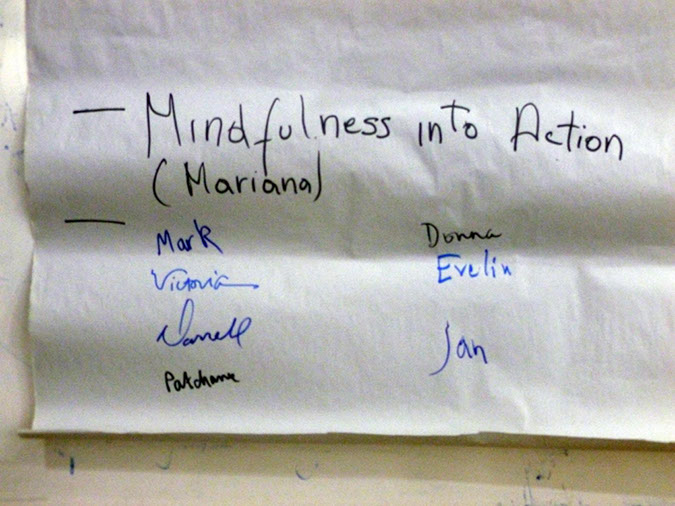
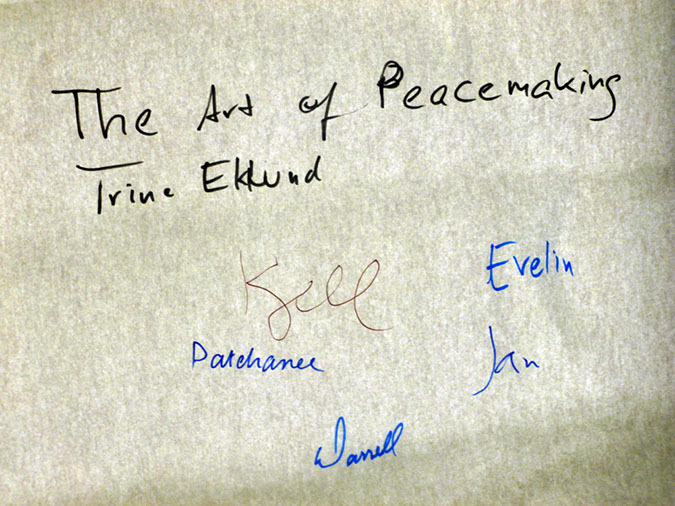
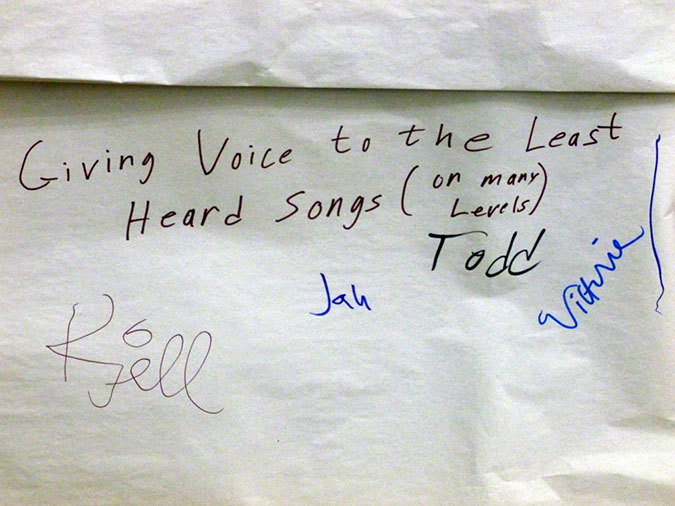
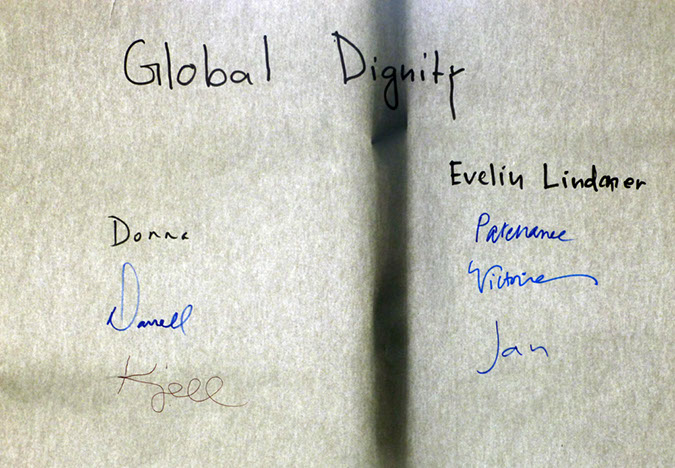
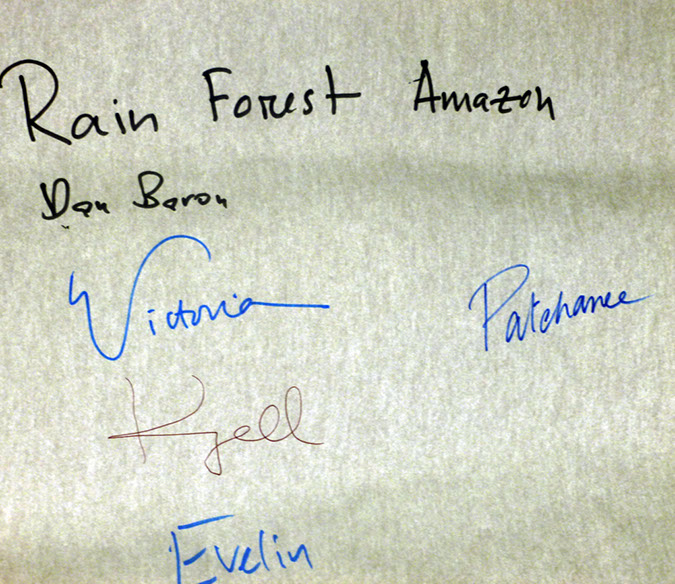
• Please click here to see our Dignilogue themes (shared in the order displayed)
• Kjell Skyllstad: Turning the Tide in Rural Thailand
• Please see the video, kindly recorded by Donna Fujimoto
• Please click here to see our Dignilogue themes (shared in the order displayed)
• Please click here to see more photos of the entire day taken by Donna Fujimoto
• Please click here to see more photos of the entire day taken by Evelin LindnerThe Life University: Learning Institute For Everyone (LIFE)
The Inpang Community Network began in 1987 with a group of village leaders in Ban Bua Village, Tambon Kut Bak, Kut Bak District, Sakon Nakhon Province in Northeast Thailand. In order to break the cycle of debt from cash‐cropping, the farmers began to transform their farm landscapes from more costly, high‐input, chemical dependent monocultures to diverse agroforestry systems that included rice for consumption as well as a wide variety of woody perennials. From a small group of twelve members, the Inpang network has grown to over 4000 members in five provinces in northeast Thailand, with linkages to many other farmer groups throughout Thailand. Inpang members grow hundreds of native woody perennial species as seedlings aimed at promoting the use of forest products from on‐farm sources, rather than harvesting and collecting from the natural, protected forests in areas such as nearby Phuphan National Park.
The Life University: Learning Institute For Everyone (LIFE)
"มหาวิทยาลยั ชีวิต"ที่มาของสถาบนั การเรียนรู้เพื่อปวงชน (สรพ.)
These days it seems people all over the country are facing problems concerning debt, family, and their very own livelihood. It is as though their community is about to fall apart; people are unable to solve the myriad of problems they are besieged with.
Despite the above situation, we have discovered that there exist a good number of people who have been able to solve their debt and other problems by themselves. We have also come across many communities that have not collapsed; on the contrary, they are strong and able to support themselves. More than just a few are outstanding to the point that many people from all over the country and from abroad have made an effort to pay them a study visit.
At a time when we are about to lose hope in our education system since it has failed to help mend the problems of poverty, debt, separation and violence, we have found that strong communities throughout the country are strong not because they are granted big budgets and many projects, but it is because they are 'learning' communities. These communities have efficiently managed their own learning processes in ways that can help solve their own problems and develop themselves.
LIFE has 'sought knowledge' from village philosophers, leaders, and from the strong communities we have visited. For the past 30 years, we have collaborated in 'joint development' of local communities all over the country. We have worked with community leaders, academics, then analyzed and synthesized the knowledge obtained from these communities and developed it into both short- term and long-term programs and those at a higher education level ; these programs are then brought back to members of the communities all over the country so they can choose to study. It is hoped that upon graduation, they can take back their knowledge and manage to successfully deal with their own problems in the same way as those individuals and 'prototype' communities.
Life University: The Meaning
The 'Life University' is a phrase specifically coined to describe a learning process that comes from life experiences. Learning here is, therefore, based on real life, real problems in our life, community and society whereas one's potential and that of his local community serve as a solid foundation and an investment capital. Learning at LIFE means learning to solve own problems and to develop oneself rather than learning 'from books' in order to pass 'exams' and take the degree they receive after graduation to look for jobs elsewhere.
The Life University is one 'form' of learning which uses life as the 'content' for learning. Emphasis is put on processoriented learning and not on rote learning or knowledge transmitting. It is a process that helps learners learn how to think, and think systematically as well as be able to create new or 'tacit' knowledge. This kind of knowledge that they have created by themselves is considered the knowledge with maximum efficiency and force that can result in desired effects.
Please read more here.• Patchanee Malikhao: Culture, Religion, and HIV/Aids in Thailand
• Please see the video, kindly recorded by Donna Fujimoto
• Please click here to see our Dignilogue themes (shared in the order displayed)
• Please click here to see more photos of the entire day taken by Donna Fujimoto
• Please click here to see more photos of the entire day taken by Evelin LindnerPatchanee Malikhao received her PhD in Sociology from the University of Queensland in Australia, a Master's of Arts degree in Mass Communication from Thammasat University in Thailand, a Master's of Science degree in Printing Technology from Rochester Institute of Technology (RIT), Rochester, New York, and a Bachelor of Science (Hons.) in Photographic Science and Printing Technology from Chulalongkorn University in Thailand. She has worked and received extensive trainings in the fields of Communication for Social Change, Imaging Technology, Social Science Research Methods and Data Analyses in Belgium, Australia, and the United States. She was a recipient of many scholarships and awards, including the Fulbright Scholarship, the Australian Postgraduate Award, and the Outstanding Teacher Award. She had worked from September 2008 to July 2011 as a researcher and a lecturer in the School of Public Health at the University of Massachusetts, Amherst, USA before she joined Thammasat University in Bangkok, Thailand in July 2011. She has become a Senior Fellow in the CSSC Center at UMass Amherst since 2010. Her latest book is Sex in the Village. Culture, Religion and HIV/AIDS in Thailand (Penang-Chiang Mai: Southbound & Silkworm Publishers, 2011). She is currently a consultant for Fecund Communication, Hong Kong.
See also:
• Interviews by Patchanee on ‘Round the world women'.
• An interview with Patchanee
The Dignilogue approach means developing the programme of the conference on the first day. Here is a list of more topics that had been proposed prior to the conference:• Michael Britton: The Art of Not Being Governed in Upland Southeast Asia
Michael Britton wrote (25 feb 2014): Dearest Evelin, I wish to send to you and Kjell and everyone involved in making this conference my very best wishes, and my deepest desire to be there with you all on what will be such a deeply moving, life-informing experience.
If there are any parts of it that can be videotaped, I am starting a public-access video program here in my home town to share things from other parts of the world that explain the world with deeper understanding and respect, so it would be wonderful to share whatever might be appropriate.
This conference comes at a time when I am reading The Art of Not Being Governed: An Anarchist History of Upland Southeast Asia by James C. Scott. In it he paints a picture of lowland civilizations/states developing in interaction with peoples living in the mountains and fleeing the states into the mountains, organizing their lives in such a way as to be beyond the power of the lowland states to incorporate them. He views this as a worldwide phenomenon, a dialectic of civilizations/states and places in which those who want no part of that enterprise preserve their own lives by living in the mountains, in the marshes, in a variety of "difficult" geographies that in the past made them beyond the reach of the states. Yet now, today, the "modern" states and corporations press everywhere to finish off the job of making everyone and every place part of their controlled domain.
I imagine that you are all right in the middle of just such a contesting of power and the right to live one's own ways unfettered by state or corporate power, though I do not know this for a fact. If so, this means you are all in the midst of a location of powerful spirituality. May this be a blessing to everyone in any way involved. I hear that you are guided by Kjell and that he is a man of great wisdom. Peace go with you all. May goodness flower all along your pathways! Michael• Kjell Skyllstad's original suggestions:
• Women's Day: Gender equality - ending domestic violence
• The ever growing problem of water and land grabbing disregarding traditional land and water rights, including the damming of rivers to the detriment of water flow and fisheries, driving people from their traditional settlements
• The ever diminishing life space for minorities and refugees
• The increasing threats to indigenous learning, traditions and culture
• The gender inequality and ingrained traditions of family violence, male dominance, etc.
• Our inability to effectively deal with humiliating living conditions in our growing urban sprawls
• Social Photography for human dignity - Jeffrey Warner
• Promoting Land and Water Rights - Association for International Water Studies (FIVAS)
• Artists Promoting Womens rights Deeyah - Filmshowing
• Documentary Arts for Human Dignity - Deeyah
• Vanishing memories - Tribal Cultures in Danger - Exposition and talks with tribal elders - Victoria Vorreiter
• Earthrights Foundation
Dinner at the Night Market
End of Day One of the Workshop Part of this Conference
Day Five, Worshop Part of this Conference, Wednesday, 12th March 2014
Chiang Mai University, Faculty of Social Sciences, Operations Building, The Meeting Room, 4th Floor (see map 1, and map_2)

• Please click here to see more photos of the entire day taken by Donna Fujimoto
• Please click here to see more photos of the entire day taken by Evelin Lindner
Welcome
Continuation of Dignilogue Sessions
• Jan Servaes: Communication/Media for Sustainable Change/Development
• Please see the video, kindly recorded by Donna Fujimoto
• Please click here to see more photos of the entire day taken by Donna Fujimoto
• Please click here to see more photos of the entire day taken by Evelin LindnerJan Servaes (PhD, 1987, Catholic University of Louvain, Belgium) is Chair Professor and Head of the Department of Media and Communication at the City University of Hong Kong; UNESCO Chair in Communication for Sustainable Social Change, and Director of the SBS Center 'Communication for Sustainable Social Change (CSSC)' at the University of Massachusetts Amherst (USA); Honorary Guest Professor at the Huazhong University of Science and Technology (HUST), Wuhan, China; Researcher at the 'Brussels Center for Journalism Studies (BCJS),' Belgium; Editor-in-Chief of Telematics and Informatics: An Interdisciplinary Journal on the Social Impacts of New Technologies (Elsevier), Editor-in- Chief of Communication for Development and Social Change: A Global Journal (SAGE); Editor of the Southbound Book Series Communication for Development and Social Change, and Editor of the Lexington Book Series Communication, Globalization and Cultural Identity. [read more]
See also:
• Some of the interviews by Jan of people like Vandana Shiva, Michael Klare, Jonathan Lash etc.
• Interviews with Jan here and here
• Websites: csschange.org, southbound.com, UNESCO
• Mohammad Abul Kalam Azad: Sustainable Development in Bangladesh: Problem and Prospects, Video | Pdf file
• Please see the video, kindly recorded by Donna Fujimoto
• Please click here to see more photos of the entire day taken by Donna Fujimoto
• Please click here to see more photos of the entire day taken by Evelin LindnerBangladesh is the most densely populated countries of the world with a population of 155 million a land mass of 147,750 sq.kms. Bangla is the state language and citizens are known as Bangladeshi. In Article 18 A : Protection & Improvement of Environment and Biodiversity; in the Constitution of the People's Republic of Bangladesh states that, "The state shall endeavor to protect and improve the environment and to preserve and safe- guard the natural resources, biodiversity, wetlands, forest and wildlife for the present and future citizens". The pursuit of sustainable development is, therefore, a Constitutional obligation in Bangladesh. Sustainable Development addresses economic, social and environmental issues which are all addressed by the Bangladesh government. In some extend country become successful and somewhere it facing extreme problems. In my paper I will try to discuss those issues.
• Deeyah Khan: Banaz: A Love Story
• Please click here to see more photos of the entire day taken by Donna Fujimoto
• Please click here to see more photos of the entire day taken by Evelin LindnerRead also:
'This Woman Was Murdered For a Kiss in a Train Station', by Deeyah Khan, Huffington Post, February 21, 2014.Lunch
• Carina zur Strassen, with her background from Peru, shared a Spanish song with us.
• Mariana Vergara: Mindfulness into Action: Protecting Minorities - A Case Study from the Rainforest in Ecuador, Video | Global Mindfulness into Action
• Please see the video, kindly recorded by Donna Fujimoto
• Please click here to see more photos of the entire day taken by Donna Fujimoto
• Please click here to see more photos of the entire day taken by Evelin LindnerMariana kindly wrote (20th February 2014): I began establishing a World Dignity University (WDU) branch in the Amazon Rain Forest in 2012. I conduct research on transformational learning with participants in the WDU Amazon rain forest initiative that aims to co-create sustainability in the Amazon with the Kichwa community.
Currently, mining conflicts in the rainforest are happening around the world where corporate interests are affecting Indigenous communities. One such occurrence was with the Kichwa community in the Ecuadorian Amazon rainforest. As I learned first-hand in the Amazon, it is common for mining companies to have indigenous people killed by hired mercenaries.
However, due to an intervention, the end result of their particular story is different because they did not react to the intrusion of a mining company in their land. Instead, the Kichwa community underwent a process of reflection allowing them to exercise their agency. This intervention made positive outcomes of the Kichwa community possible because this intervention provides the space for participants to experience a reflection process. These positive outcomes occurred in 2009, after the transformational learning experience of this Indigenous community.
On July 2009, I pre-assessed the situation of the Kichwa Indigenous community of Rio Blanco in the Amazon rain forest. The community experienced the intrusion of an illegal mining company who set out to destroy the forest. Through my intervention, I enabled the indigenous community of Rio Blanco to remove the mining company from their territories without the use of violence. By 2010, they had expulsed four other mining companies in the same manner. Until then, the community did not have legal ownership to their land, but by 2011, all 45 extended families (472 people) obtained their property titles. By 2012, the WDU branch was established. On 2013, Hroar Klempe went to the WDU branch and in order to bring students to this branch, we wrote a proposal for the Norwegian Research Council.• Trine Eklund: The Art of Peacemaking: Innovative Approaches to Conflict Transformation and Violence, Particularly Violence Against Women
• Please see the video, kindly recorded by Donna Fujimoto
• Please click here to see more photos of the entire day taken by Donna Fujimoto
• Please click here to see more photos of the entire day taken by Evelin LindnerThe fifty-eighth session of the Commission on the Status of Women will take place at United Nations Headquarters in New York from 10 to 21 March 2014. Representatives of Member States, UN entities, and ECOSOC-accredited non-governmental organizations (NGOs) from all regions of the world attend the session. Please see here the recommendations to the Norwegian government formulated by a meeting, which was held on 30 January 2014 as part of the FOCUS Contact Conference in 2014. This document by FOKUS- Forum for Women and Development is intended to provide constructive input to the Norwegian authorities at The Commission on the Status of Women 2014, and other international fora, including bilateral and multilateral meetings with other states, where issues relevant to women's rights and gender equality are discussed.
- A luncheon was hosted by Secretary-General of the United Nations Ban Ki-moon with the Millennium Development Goals (MDG) Advocacy Group on 23rd February 2014 together with the two Co-chairs, President Paul Kagame of Rwanda and Prime Minster Erna Solberg of Norway. The statement by Erna Solberg was titled 'Why girls?' See www.ghdnews.com.• Todd Saurman: Giving Voice to the Least Heard Songs
• Please see the video, kindly recorded by Donna Fujimoto
• Please click here to see more photos of the entire day taken by Donna Fujimoto
• Please click here to see more photos of the entire day taken by Evelin Lindner• Evelin Lindner: Global Dignity
• Please see the video, kindly recorded by Donna Fujimoto
• Please click here to see more photos of the entire day taken by Donna Fujimoto
• Please click here to see more photos of the entire day taken by Evelin LindnerSee here the paper titled Global Dignity: What Is It? How Do We Achieve It? that was written after this conference and brings together Evelin's insights on global dignity with the experiences and insights she gathered in Thailand in March and April 2014. It draws together her presentations that she gave at the following two conferences:
- Urban Dignity: What Is It? How Do We Achieve It?, presentation given at the 12th Urban Culture Forum, 'Arts and Social Outreach - Designs for Urban Dignity', organised by The Urban Research Plaza, Chulalongkorn University, Bangkok, Thailand, 3rd - 4th March 2014.
- Global Dignity, presentation given at the 23rd Annual Conference of Human Dignity and Humiliation Studies 'Returning Dignity', in Chiang Mai, Northern Thailand, 8th - 12th March 2014.
See also:
- Introduction by Kjell Skyllstad and Evelin Lindner, and Presentation of Participants
The 23rd Annual Conference of Human Dignity and Humiliation Studies, 'Returning Dignity', took place in Chiang Mai, Thailand, 8-12th March 2014. On Day One, 8th March 2014, Kjell Skyllstad and Evelin Lindner opened the conference. The video was recorded by a professional team invited by Chiang Mai University.
- At the Learning Center, Interview with Carina zur Strassen and Evelin Lindner
The 23rd Annual Conference of Human Dignity and Humiliation Studies, 'Returning Dignity', took place in Chiang Mai, Thailand, 8-12th March 2014. On Day Three and Four, on 10th and 11th March 2014, the participants of the conference had the great privilege of being welcomed to Suan Lahu, a Lahu village in Northern Thailand, by Carina zur Strassen. This conversation between Carina zur Strassen and Evelin Lindner was kindly recorded by Donna Fujimotoon 10th March 2014.
- At the Learning Center of the Lahu Village Suan Lahu in Northern Thailand
The 23rd Annual Conference of Human Dignity and Humiliation Studies, 'Returning Dignity', took place in Chiang Mai, Thailand, 8-12th March 2014. On Day Three and Four, on 10th and 11th March 2014, the participants of the conference had the great privilege of being welcomed to Suan Lahu, a Lahu village in Northern Thailand, by Carina zur Strassen. The video was kindly recorded by Mark Petz on 10th March 2014. It shows Evelin Lindner briefly explaining the work of the Human Dignity and Humiliation Studies network.• Dan Baron: Greetings from the Brazilian Amazon
Dan Baron sends his greetings with the following two videos on the Arts-based Pedagogical Work in the Amazonian North of Brazil that he and his partner Mano Souza conduct in Brazil:
- Dance and Returning Dignity: Raízes e Antenas (o processo) - Roots and Antennas (the process) (published on 12th February 2014)
- Festival Beleza Amazônica: Youth Leadership Through the Arts (published on 27th January 2014)
- Festival Beleza Amazônica (published on 4th November 2013)
The original plan was for Dan to speak to us via Skype from the Brazilian Amazon (10 hours time difference: 20:00 in Chiang Mai is equivalent to 10:00 in Marabá).
See more further down.
Beacon of Dignity Award: Chayan Vaddhanaphuti
Victoria Vorreiter guided us to have dinner at the Riverside Restaurant, thank you, dear Victoria! Dinner was planned as an open arrangement, as Chiang Mai has many wonderful restaurants!
End of Conference, Beginning of Future Collaboration
Day Six and Seven, Full Day Excursion and Overnight Homestay in the Pgak' Nyau (Karen) village Ban Nong Tao in the Mae-Win Subdistrict, Mae Wang District, Chiang Mai, Northern Thailand, Thursday and Friday, 13th - 14 March 2014
We listened to Joni Odochao, his son Zwae Siwakom Odochao, and his brother-cousin Otzie (Chindanai Jowaloo, or also Chai) and learned immensely from their deep and profound insights. We also met Joni Odochao's wife, Zwae's mother, as well as Otzie's mother, and other members of the community. And we met with Peter Derling from the United States, the first student of the Lazy School!
Please see the Proclamation on Rural Resilience that we sent off to the United Nations after listening to Joni Odochao, Zwae, and Otzie, with the aim to help secure the rights of indigenous peoples in the post-2015 development goals. We understood from Joni Odochao, Zwae, and Otzie that these rights are of central significance for all of humankind's survival, much more than simply of marginal importance for a few minorities. They helped us better understand the dilemma that education, TV, and the digital world can be either beneficial or destructive to sustainable ways of living. As Peter Dering, the first student of the 'Lazy School' formulated it so well on 13th March 2014: our vision must be to expand community learning to include modern knowledge through technology, rather than lose community learning! The proclamation was initiated by Mark Petz and we sent it directly to the delegates meeting at the same time at the UN in NY to shape the 2015-2030 policy goals.
In that way we attempted to connect the grass-roots in the village directly with the highest international policy making bodies.
If we are listened to, we don't know, but we feel that we have to do our best.
We thank Trine Eklund for connecting us with Magnus Hotfold from the Forum for Women and Development. We are grateful to Magnus for making us aware that there was not much focus on rural and indigenous women in the agreed conclusions from the 2014 Commission on the Status of Women (CSW).
A Session of the Permanent Forum on Indigenous Issues will be held at the UN on 12-23 May 2014, and the World Conference on Indigenous Peoples will take place on September 22-23, 2014, in New York City, which can play an important role in securing the rights of indigenous peoples in the post-2015 development goals.
Please listen also to Karen singer Chi Suwichin, who reminds us that we have to avoid being like those outsiders - the "external white chicken" - who come to indigenous peoples and take everything until nothing is left....
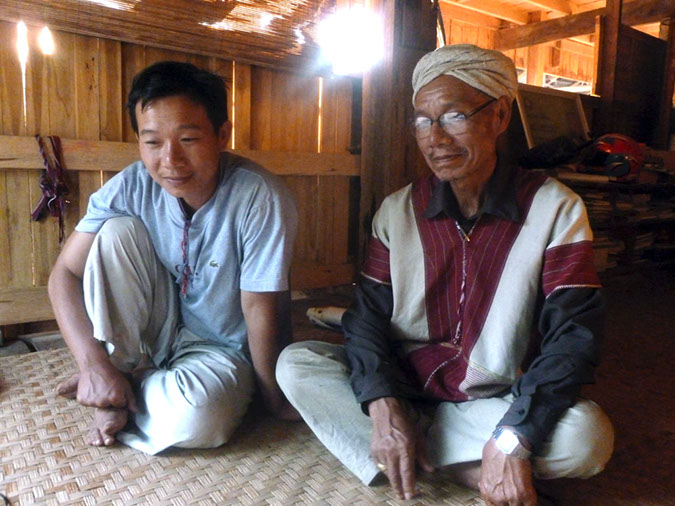
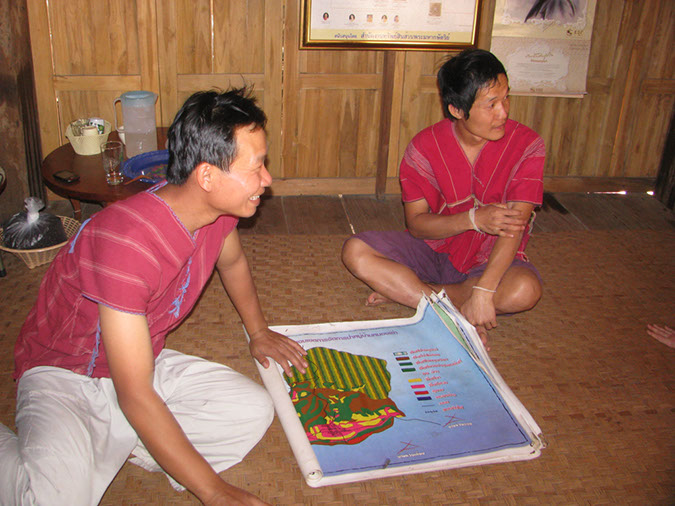
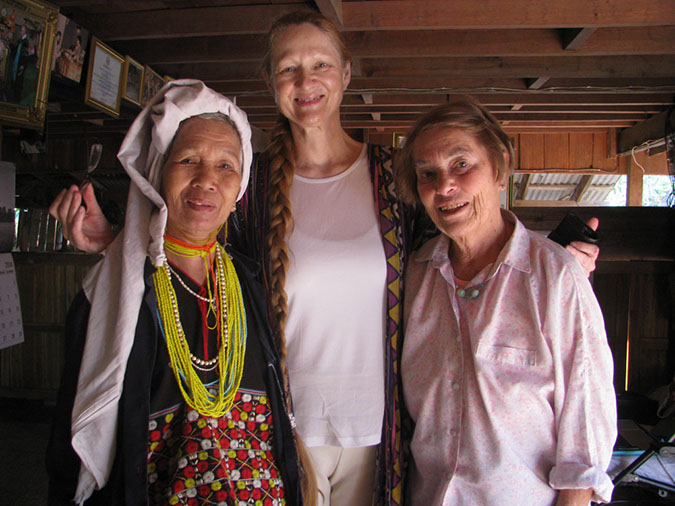
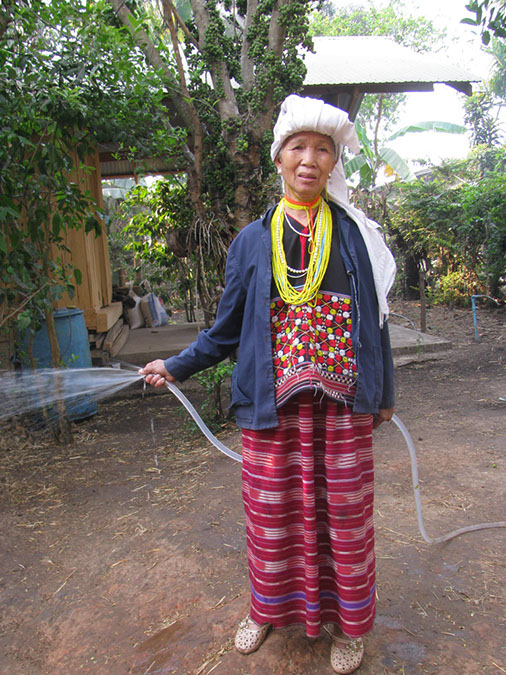
Please see the videos:
• 29 Zwae Siwakom Odochaw and
Otzie (or Chindanai Jowaloo, or also Chai) Present Their Pgak' Nyau Village Ban Nong Thao in Northern Thailand (at 1200 Meters Height) on 13th March 2014, see the long version of one hour or part 1 | part 2 | part 3
• 30 An Elder Speaks: Joni Odochaw, Karen Sage and Former Village Headman from Ban Nong Thao, in Conversation with Mariana Vergara, Sharing the Voice of the Indigenous Peoples from South America, 13th March 2014 (we apologise that the conversation ends abruptly, due to technical problems)
• 31 Clothing Traditions: Joni Odochaw, His Wife, His Son Zwae, Together with His Cousin Otzie and His Mother, 14th March 2014
• 32 Vision for the Future: Joni Odochaw, His Son Zwae, and His Cousin Otzie Speak about the Karen Vision of Life, 14th March 2014
• 33 The Lazy School's First Student Peter Dering, 14th March 2014
Please see the still photos:
• Please click on the pictures at the top or here to see more photos taken by Evelin Lindner.
• Please click on the picture at the bottom or here to see more photos taken by Trine Eklund.
On the wall in the sleeping room under the roof we found a poster of the
Inaugural International Symposium on Local Wisdom and Improving Quality of Life
August 8-10, 2012, Chiangmai
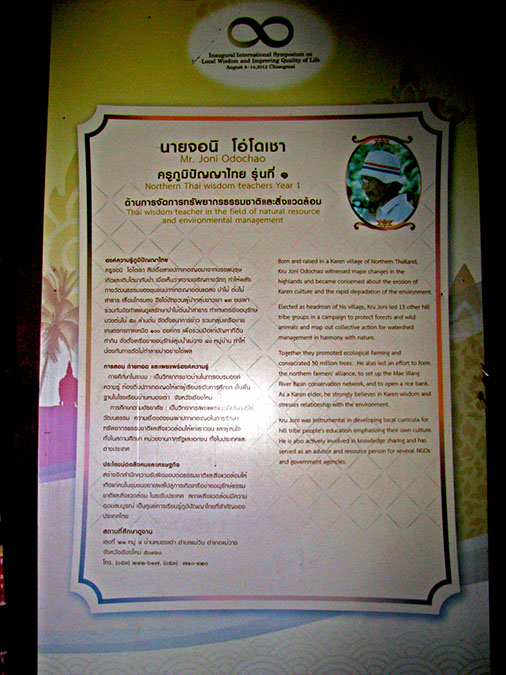
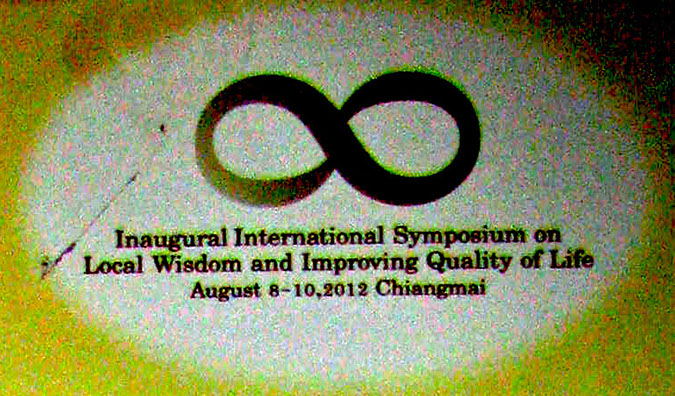
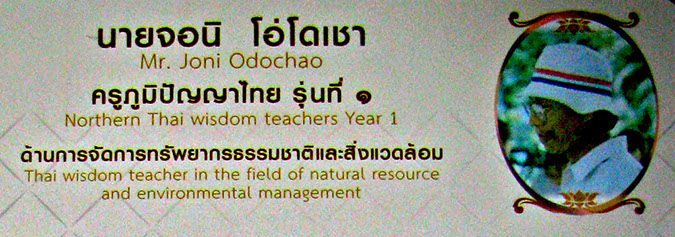
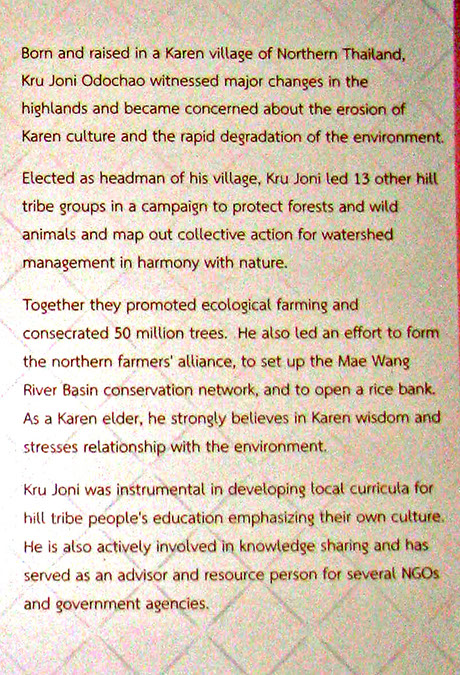
This is the text that introduces Joni Odochaeo:
Mr. Joni Odochao, Thai wisdom teacher in the field of natural resources and environmental management, Northern Thai wisdom teachers Year 1:
Born and raised in a Karen village of Northern Thailand, Kru Joni Odochao witnessed major changes in the highlands and became concerned about the erosion of Karen culture and the rapid degradation of the environment.
Elected as headman of his village, Kru Joni led 13 other hill tribe groups in a campaign to protect forests and wild animals and map out collective action for watershed management in harmony with nature.
Together they promoted ecological farming and consecrated 50 million trees. He also led an effort to form the northern farmers' alliance, to set up the Mae Wang River Basin conservation network, and to open a rice bank. As a Karen elder, he strongly believes in Karen wisdom and stresses relationship with the environment.
Kru Joni was instrumental in developing local curricula for hill tribe people's education emphasizing their own culture. He is also actively involved in knowledge sharing and has served as an advisor and resource person for several NGOs and government agencies.
Links:
Please listen also to Karen singer Chi Suwichin, who reminds us that we have to avoid being like those outsiders who come to indigenous peoples and take everything until nothing is left....
Nature the Best Teacher: Re-Connecting the World’s Children with Nature
Written by Kamran Mofid, 10 April 2015
More than parent and student communities, the teaching fraternity needs to understand that the essential purpose of education is not to enable students to earn a living, but to learn how to live life. As the primal teacher, Mother Nature teaches both the secret of life, which is to respect all life, and also how to live one’s own life in harmony and balance with all creation, exemplified by the manner in which various species of the natural world live in peaceful co-existence.'
'Picture a school where the natural environment becomes the classroom and Nature becomes one of the teachers. Even students who don't exhibit "nature smarts" will become more attuned and connected to the world around them. And as many wise people have said, we can't save something we don't love, and we can't love something we don't know. Don't we owe it to our students to help them develop their naturalist intelligence?'
See also: Louv, Richard (2009). Last child in the woods: Saving our children from nature-deficit disorder. London: Atlantic Books.
Kamran recommends:
First video: Project Wild Thing: Producer David Bond, 'A gripping story of the desperate struggle to lead our computer-crazed children back to nature.'
Second video: It's Time to Rewild the Child, '
In this video George Monbiot argues that the more time children spend in the classroom, the worse they do at school because our narrow education system only rewards a particular skill set. He says that when you take failing pupils to the countryside, they often thrive – yet funding for outdoor education is being cut.'
"Making Sense of Place: School-Farm Cooperation in Norway," by Erling Krogh and Linda Jolly (2011)
In: Children, Youth and Environments 21(1): 310-321
Abstract:
This paper describes the Norwegian "Living School" national project and its related university extension course, "The Farm as a Pedagogical Resource." Since the national initiative began in the late 1990s, more than 250 separate local projects have been developed through the course. Here we focus on one such project in the community of Aurland. It illustrates the basic principal of "rooting" students in life processes and in the places in which they live through participation in practical, meaningful work outdoors.
Wendell Berry Agriculture for a Small Planet Symposium July 1, 1974
Email from the Schumacher Center for a New Economics, schumacher@centerforneweconomics.org, on July 4, 2014:
In his presentation at the 1974 Agriculture for a Small Planet Symposium in Spokane, Washington, Wendell Berry remarked:
"Few people, whose testimony would have mattered, have seen the connection between the modernization of agricultural techniques and disintegration of the culture and the communities of farming."
"This community killing agriculture, with its monomania of bigness, is not primarily the work of farmers, though it has burgeoned upon their weaknesses. It is the work of institutions of agriculture, the experts and agribusinessmen who have promoted so-called efficiency at the expense of community and quantity at the expense of quality."
"In the long run, quantity is inseparable from quality. To pursue quantity alone is to destroy those disciplines in the producers that are the only assurance of quantity. The preserver of abundance is excellence."
"Food is a cultural, not a technological, product."
Our thanks to our friends at the Berry Center in Henry County, Kentucky for posting this historic video of Berry's talk.
The Symposium launched the Tilth movement and helped Berry clarify the arguments that led to the 1977 publication of The Unsettling of America: Culture and Agriculture -- one of the most influential books of the past fifty years.
At the 1976 Lindisfarne Fellows meeting Berry read from the extraordinary "The Body and The Earth" chapter of The Unsettling of America. In it he describes the estrangement of the sexes as parallel to our estrangement from the land, and seeks for ways to address that estrangement. Our thanks to William Irwin Thompson, Lindisfarne founder, for permitting us to digitalize and post this and all the other Lindisfarne talks at the Schumacher Center's audio files at archive.org.
Then in 1981, Wendell Berry spoke at the First Annual E. F. Schumacher Lectures, setting a standard for the series now in its 34th year. The theme of the Lectures was "People, Land, and Community." Berry commented that these three were linked in local culture -- a culture that could not be imported.
"It would begin in work and love. People at work in communities three generations old would know that their bodies renewed, time and again, the movement of other bodies -- living and dead, known and loved, remembered and loved -- in the same shops, houses, and fields. That, of course, is the description of a kind of a community dance. And such a dance is perhaps the best way to describe harmony."
Mark Petz wrote on July 8, 2014: This fits in very much with what organic agriculture does with the IFOAM Principles, where they have Community Supported Agriculture "adapted to the natural rhythm of the seasons and is respectful of the environment, natural and cultural heritage and health." They value cultures through the participatory guarantee schemes, "We consider it essential to recognise local cultures and to preserve traditional know-how, which has always respected nature and favoured a sustainable management of resources."
Culture, Politics & Pedagogy: A Conversation w/ Henry Giroux
Uploaded on 5 Dec 2006
An active citizen, says the prolific and influential Henry Giroux, is "somebody who has the capacity not only to understand and engage the world but to transfom it when necessary, and to believe that he or she can do that." In this provocative new interview, Giroux speaks with passion about the inextricable links between education, civic engagement, and social justice. Strongly influenced by Paulo Freire, the Brazilian scholar of progressive education, Giroux advocates for a pedagogy that challenges inequality, oppression, and fundamentalism. Essential viewing for students of education, cultural studies, and communication.
Participants
If you wish to participate in one of our future conferences, please email us!
• Chayan Vaddhanaphuti, host, convener, and organiser of this conference
• Kjell Skyllstad, host, convener, and organiser of this conference
• Tom Fawthrop, author of The Khmer Rouge Tribunal: Getting Away with Genocide and
Director of Killing the Mekong: Dam by Dam, Eureka Films, see Trailer
• Darrell Moen, see also dgmoen.net
• Marie Ingand and her daughter
• Mark Petz
• Cornelia Dragusin, Ph.D., in Ethnomusicology, School of Music, Australian National University, Canberra
• Patchanee Malikhao received her PhD in Sociology from the University of Queensland in Australia, a Master's of Arts degree in Mass Communication from Thammasat University in Thailand, a Master's of Science degree in Printing Technology from Rochester Institute of Technology (RIT), Rochester, New York, and a Bachelor of Science (Hons.) in Photographic Science and Printing Technology from Chulalongkorn University in Thailand. She has worked and received extensive trainings in the fields of Communication for Social Change, Imaging Technology, Social Science Research Methods and Data Analyses in Belgium, Australia, and the United States. She was a recipient of many scholarships and awards, including the Fulbright Scholarship, the Australian Postgraduate Award, and the Outstanding Teacher Award. She had worked from September 2008 to July 2011 as a researcher and a lecturer in the School of Public Health at the University of Massachusetts, Amherst, USA before she joined Thammasat University in Bangkok, Thailand in July 2011. She has become a Senior Fellow in the CSSC Center at UMass Amherst since 2010. Her latest book is Sex in the Village. Culture, Religion and HIV/AIDS in Thailand (Penang-Chiang Mai: Southbound & Silkworm Publishers, 2011). She is currently a consultant for Fecund Communication, Hong Kong.
• Jan Servaes (PhD, 1987, Catholic University of Louvain, Belgium) is Chair Professor and Head of the Department of Media and Communication at the City University of Hong Kong; UNESCO Chair in Communication for Sustainable Social Change, and Director of the SBS Center 'Communication for Sustainable Social Change (CSSC)' at the University of Massachusetts Amherst (USA); Honorary Guest Professor at the Huazhong University of Science and Technology (HUST), Wuhan, China; Researcher at the 'Brussels Center for Journalism Studies (BCJS),' Belgium; Editor-in-Chief of Telematics and Informatics: An Interdisciplinary Journal on the Social Impacts of New Technologies (Elsevier), Editor-in- Chief of Communication for Development and Social Change: A Global Journal (SAGE); Editor of the Southbound Book Series Communication for Development and Social Change, and Editor of the Lexington Book Series Communication, Globalization and Cultural Identity. [read more]
• Pauline I. Erera and Richard A. Weatherley
Pauline kindly informed us (on 2nd March 2014) of a local event in Chiang Mai celebrating Women's Day on March 8.
It's taking place in the Suan Bauk Haad Municipal Garden (south west corner of the moat), which was established in 2006 for women to come together on the Women International Day. This year, it starts at 9am on
March 8 Zonta Rose Day, and you can join Zonta planting yellow roses. Wear yellow and your most colourful sun-hat.
• Judith M. Mandel
• Christina Jordan, Founding Collaborator, Evolutionize It, and see also her work with Ci2i Global
These participants joined us virtually
• Stephen Gerardo, with partner Susan Straight, who heads the NGO Center for Intercultural Education in Yunnan, China, working around youth empowerment through interfacing and service to marginalised communities for the last 8 years.
• Deeyah Khan: Banaz: A Love Story
Read also: "This Woman Was Murdered For a Kiss in a Train Station,"
by Deeyah Khan, Huffington Post, February 21, 2014.
• Dan Baron sent his greetings from the Brazilian Amazon with the following two videos on the Arts-based Pedagogical Work in the Amazonian North of Brazil that he and his partner Mano Souza conduct in Brazil:
- Dance and Returning Dignity: Raízes e Antenas (o processo) - Roots and Antennas (the process) (published on 12th February 2014)
- Festival Beleza Amazônica: Youth Leadership Through the Arts (published on 27th January 2014)
- Festival Beleza Amazônica (published on 4th November 2013)
The original plan was for Dan to speak to us via Skype from the Brazilian Amazon (10 hours time difference: 20:00 in Chiang Mai is equivalent to 10:00 in Marabá).
Earlier, Dan had shared with us the story of Alexandre and how he was executed in his wheelchair. See Alexandre in the picture on the left. Click on the pictures or here to see more photos. See the videos made in Brazil when Evelin spent time there in June 2012. See also Evelin's Digniventure reflections.
Dan Baron, please click on the picture to see it larger.
The Castanheiras of Eldorado dos Carajas 1999 (10m x 15m x 25m), please click on the picture to see it larger.
Military police is moved to sing in the school of the assassinated art educator Maria Silva, 24th August, NovaIpixuna, Para, Amazonia. Please click on the picture to see it larger. See also Colheita em Tempos de Seca or Harvest In Times of Draught, a CD that provides a celebration of the Amazon as a source of human values and rich popular culture, by those who live both everyday. But it also reminds of its vulnerability. It is an inspiring resource for all educators and communities who seek a sustainable futureDaniel Baron is a playwright, community-based arts-educator and cultural activist, presently living and working in Marabá, in the Amazonian state of Pará, northern Brazil. He studied English Literature at Oxford University where he did doctoral research into theatre as popular education. After a decade of community theatre and mural collaborations dedicated to conflict transformation and social justice with excluded communities in Manchester (Northern England) and Derry (North of Ireland), in 1994 Dan accepted a permanent post in theatre and popular education at the University of Glamorgan, in Wales. He left Wales in 1998 to collaborate as a Visiting Professor at the State University of Santa Catarina and has been collaborating with communities within the Landless, Indigenous, Trade Union and University movements of Brazil ever since. His Pedagogy of Transformance emerged through these collaborations and dialogues with other cultural movements in Asia, Africa, Latin America and Europe. Two national awards in 2008 and 2010 from the Ministry of Culture and a national UNICEF award in 2011 allowed Dan to accept an invitation to live and collaborate with the Afro-Indigenous community of Cabelo Seco ('dry hair'), founding community of the city of Marabá, in the quest to develop sustainable communities through living popular culture.
Between 2004-10 Dan was the President of IDEA (International Drama/Theatre and Education Association), and Coordinator of the World Alliance for Arts Education between 2006-2010. He is a member of the World Council of the World Social Forum.
Dan wrote from Cabelo Seco ('dry hair'), in Marabá, southeast of Pará, in the Amazonian north of Brazil, on 22nd August 2011:
Good morning from the Amazon! On this world day of action against the building of the hydro-electric plant, Belo Monte, on the Xingu River in the Brazilian Amazon (to be the third largest plant in the world), with unpredictable, irreversible sociocultural and environmental damage in the region which will impact on all of our lives, we present two songs...
- Alerta Amazonia (Zequinha de Cabelo Seco)
- Clamor popular (Zequinha de Cabelo Seco)
- See the booklet of songs from the Brazilian Amazon which includes the translation of Alerta Amazonia (from the Transformance Archive)
Both songs have emerged in Cabelo Seco, an afro-indigenous community on the periphery of Marabá, Pará, where we live and work. The riverside community is already suffering serious consequences of the large dams completed in the past two years. The songs have been developed by our friend, project collaborator and art-educator Zequinha de Cabelo Seco, inside our project Backyards of Cultural Solidarity. We hope they contribute to the broadening of the international quest for a living, sustainable Pan-Amazônia.
Even if you don't understand the poetic lyrics, we believe you'll understand their emotions. Please write to us if you would like a translation, and feel free to use the songs in your own projects and community. Here are some links if you'd like more information:
www.avaaz.org/en/amazon_under_threat/
www.avaaz.org/en/save_the_amazon_a/?fp
Many thanks. An amazonian hug!
Dan Baron e Mano Souza
Cabelo Seco, Marabá
Institute Transformance/ABRA
Dan wrote on 23rd August 2011:
'The conference takes place during my final 5-day period of intensive writing (and type-setting of my new book 'Harvest in Times of Drought: a pedagogy of life for sustainable community', written with 50 rural, riverside and forest arts-educators), but I would like to make myself available for 90 minutes, if that works for you. Is there a definite open or closed space where I could share reflections on what we have learned from arts-based pedagogical work in response to the destruction of the Amazonian forests? I could speak very concretely on how a group of 50 teachers transformed a culture of collusion into an community-based ethics of co-responsibility, based on reflexive solidarity and cooperation. This could also connect to our response to the assassination of our student/grandmother/eco-pedagogue Maria Silva (on May 24). Alternatively, or within the same contribution, I could speak about our work with young people as cultural organizers and artists, transforming themselves, to transform their own afro-indigenous community, one of the poorest and allegedly most violent in Maraba, cradle of the 'industrialization of the Amazon'.
Participants who unfortunately were hindered to join us:
• Md. Feroz Ahmmead
• Chandra Prasad Siwakoti and his wife Kamala Devi Pandey
• Deepak Tripathi and his wife
• Dr. Kirtiraj D. C.
Dignilogue - Open Space and What It Entails
Introduction into the Open Space Format by Linda M. Hartling (created on 13th August 2012)
(see also Open Space Tools by Peggy Holman)
Donald Klein explained the Open Space design as follows (2006): It involves creating a kind of 'marketplace' of possibilities based on topics nominated by participants. The only requirement is that whoever nominates the topic, acts as the convener of the discussion of the topic and takes responsibility for having notes taken. A report is subsequently made about the essence of what was discussed, including any conclusions or recommendations, at a plenary session following the topic groups.
The Open Space design has the advantage of focussing on whatever is of greatest interest to participants at the moment. It allows for parallel discussion of multiple topics, followed by a period of sharing and general discussion.
Alan Klein kindly wrote (31/10/2005): One of the key elements in making an OS event successful is the focusing of the question that the participants respond to. Another is being clear about what will be done with the information presented and/or decisions made in the OS event itself.
I would like you all (and any others who should be involved in this as well) to begin thinking and dialoguing about what would be the most question that you would most like to see grappled with by the participants. This may or may not include a sense of the decision(s), or type of decision(s) that you want the participants to come to or you may decide that the OS event is just for gathering and focusing energy and not to some to any decisions.
Thanks,
~Alan
On 14th December, 2005, we had a Board Meeting in NY:
We discussed our Open Space Section. Don explained that we could have different levels, a more open and general level and a more focused level. At the more open level we would discuss what is on our minds, at the more focused level, we would form 'buzzgroups' on particular topics, such as business, research, education, fundraising, non-profit.
Don Klein kindly wrote (30/12/2005):
[...] The main point I recall dwelling on at some length had to do with deciding first on the content of a session and its purpose; then deciding what meeting technology to use. Open Space is often used when the purpose is to make it possible for individuals to focus on aspects of a general topic that are of special interest to them. The participants themselves choose what they want to discuss. No one knows in advance how many groups there will be and what they'll be discussing.
Buzz groups are used as a way to break a large meeting down into smaller sections (usually from six to twelve or so people). All the buzz groups can be assigned the same topic; or different buzz groups can be assigned different aspects of the same topic; or buzz groups may be divided among two or more different - usually related - topics.
The main point is to decide what is to be the topical focus and what outcomes are desired from a session. Then pick the technique that promises to help us achieve the purpose.
Love, Don
Sophie Schaarschmidt kindly wrote (02/01/2006):
What I would suggest for a following workshop (and this is my very personal view) is to create discussion forums as open choices. The open space technology as I know it, and as it is used mainly in the field of training involves participants in a unique way. The first step is like an open brainstorm session involving all participants. In this session, participants can come up with a topic that they want to (present and) discuss. All topics are written down and similar topics might be combined into one topic. This process can happen either beforehand via email or a web-forum or at the workshop on a blackboard. Once the discussion topics are defined the person that proposed a certain topic would announce a time and a space when and where the topic will be discussed. In a full day of open-space, up to 50 topics could be discussed. People are free to join and leave a discussion. As a metaphor, people are like bees flying from one topic to another, participating in a discussion as long as it feeds their interest and taking the honey from it as well as contributing to it, and leaving the discussion when it takes a turn into a direction that they are less interested in or when they wish to participate in other discussions on other topics as well. Normally people take part in 3 to 10 discussions a day. Therefore, people are free to select the topics they are interested in and move to other discussions, as listener or both, listener and contributor. Each discussion group is also free in putting their time frame, and scheduling breaks. Of course, there should be a time frame for the open-space session, let's say it would take place from 1pm to 5pm in the afternoon. Yet, discussion groups can schedule their space (location), time frame (a discussion could last half an hour or three hours: as much as it takes to explore the issue) and breaks themselves. The only condition is that the discussion topic, its location and starting time will be announced (or written down on a public board) so that all participants know when which subject will be discussed where.
I participated twice in such an open-space session and I was very much impressed by its power and evolving possibilities. Not only were people more active, excited and engaged, taking little breaks, but also people felt they could gain and contribute most in this process. They felt they were free to choose which discussions to engage in, and it was an easy way to make contacts with those people interested and engaged in topics similar to one's own. By being able to set an own time frame discussions were deeper than usual, and by participants moving from one topic to another, joining (and making new contributions) or leaving a discussion the discussions stayed vivid and interesting, and many perspectives could be shared. At the end of a discussion each group filled in an A4 page which contained the title of the discussion group, a list of the names of the people who contributed in the discussion, and a summary of what was discussed (the main stances). All the discussion summaries can be combined to a book at the end of the conference providing people with a tremendous treasure of topics and insights.
Another advantage of the open-space technology (as I experienced it) is that people stay 'fresh' in the workshop. The discussion excites and revives people and forms a good basis for getting to know each other and going on with the discussions at a later time in the workshop (e.g. during lunch).
It might be worthy to try the open-space technology in a HumanDHS workshop meeting substituting the round table sessions, or in addition to them. The only difficulty I'm aware of might be that we would need many spaces (rooms) where the discussion groups could spread for their discussions.
[...]
Good luck for your work in 2006!
Yours warmly,
Sophie Schaarschmidt
Linda M. Hartling kindly wrote in response to a message from Carlos Sluzki (21/01/2006):
How do we maximize the quality of work together when we are a group of individuals with dramatically varying levels of experience? This is such an important topic I think we should discuss it at our next meeting in Costa Rica. Perhaps, we could use some of our Board meeting time to discuss this? In addition, perhaps we could use some of our 'open space' time to explore people's view of this dilemma? I suspect that all of us involved with the operations of this network share a desire to optimize our efforts, to move the work forward efficiently and effectively. When we use an all-inclusive format at our meetings, we risk back tracking and dealing with questions that have obvious answers (e.g., convincing some newer attendees of the significance humiliating behavior). (...) In the words of Peter Drucker, I would like to see our group create conditions that 'strengthen our effectiveness and make our weaknesses irrelevant'. But, how do we do this in a way that promotes the dignity of all the people who attend our meetings? I'm trying to think of some examples of organizations that do this... perhaps, Linda Stout's Piedmont Peace Project? Not too long ago I read a book entitled, 'The Wisdom of Crowds', which I think is relevant to our questions about inclusion/exclusion. It
describes the conditions for 'wise crowds'. (Surowiecki, J. (2004). The Wisdom of Crowds: Why the Many Are Smarter Than the Few and How Collective Wisdom Shapes Business, Economies, Societies, and Nations. New York: Doubleday.)
Don Klein kindly responded (28/01/2006):
I very much support the focus on where we want to go. Suggest working in interest groups part of the time: i.e., education, research, civic action, global community building. And include a way for groups to emerge around other areas of interest. for that matter, if only one person had an
interest and wanted to develop it further and then share his/her thoughts with us, that might also be possible.
Love, Don
Don Klein kindly wrote (28/01/2006):
I'd like to offer some experiences with the network originally known as National Training Laboratories. This network, begun around 1950, is sstill in existence today; it has changed, however, in ways that seem relevant to the issues raised.
The network originally was a group of 'originators' of theory and practice in the area of group dynamics. Most of them had participated in the discovery of 'sensitivity groups' or the t=group method. After almost a decade, the more experienced people in the network became Fellows, as distinct from ordinary Members of the network. To admit someone to their membership, all the Fellows had to agree that the applicant's credentials merited inclusion in the Fellows. During t his initial period, which lasted about ten years, selected members of the network participated as staff members of two and three-week training programs for the general public, using the t-group method. An enormous amount of theory building took place as faculty spent three or four days preparing each of the training labs. It should be noted that most of the network were academics engaged in one or another of the social sciences, in areas related to democratic participation in social change. They were all motivated by their common passion and some of them felt that the two or three weeks they spent with their colleagues from around the country were the most meaningful and exciting of the entire year.
In the 1960s, questions arose about the suitability of having a 'class' system in the network. The Fellows were seen as an anti-democratic perversion of the ideals and purposes of NTL. And so the Fellows class was discontinued.
At about the same time, financial difficulties led to a reorganization of NTL, which included dissolution of the existing netework and inviting a more diverse group (sex, race, and ethnically) to form a new network. The theory and practice of Organization Development, meanwhile, had emerged and more and more of NTLs network members became engaged in OD practice, while fewer and fewer network members were engaged in academic pursuits.
In my view the social impact and creativity of the current network have been reduced by NTL's growing emphasis on operating profitably as a 'business'.
There is currently an upsurge (how strong we don't know) of those wishing to advocate working on participative ways to democratize our institutions and our society. Some of the network members are placing an increased emphasis on creating an international network and of promoting global community.
A major point in all of this history for me is that there is no 'ideal' and certainly no 'absolute' way of resolving questions having to do with competency, interest, and inclusion. Based on the above history, my inclination is to favor the 'class' system; i.s., creating a group of qualified researchers, practitioners, and policy shapers to work together to shape, participate in, and contribute knowledge and skills to the work of HDHS network, including those activities that enable it to raise money by grants, contracts, income from training programs, and contributions.
These comments are lengthy. I hope they're helpful.
Love,
Don
Linda M. Hartling kindly wrote (27/04/2006):
In terms of Open Space...I think we should have some of the same groups we had in Berlin, with room for a couple of new groups. For example, we could have an education group, a research group, a business group, etc. It would be helpful to have these key groups continue their discussions, rather than creating all new groups. Didn't we talk about having 'buzz groups', meaning groups addressing topics that people want to continue to move forward? The education, research, and business groups could be buzz groups.
The following Dignilogue topics were proposed in different conferences, yet, the facilitators are unable to come. The topics are listed here, because they might inspire you.
• Giving Voices to the Environmentally Humiliated and Misrecognized: Nature and Women by Keitaro Morita (adapted from a similar presentation at the 9th Annual Conference of Human Dignity and Humiliation Studies in Hangzhou, China, 13th-16th April 2007)
• Peace: A World History, by Antony Adolf (2009)
• Native Hawaiian and Polynesian Communities, by Dharm P. S. Bhawuk and Neil Ryan Walsh (Neil was unfortunately hindered to join us) (2009)
• Familiarization and Its Ways: Is Ragging/Bullying an Archaic Method of Interaction, by Harsh Agarwal (2009)
• Humiliation and Dreams, a talk/session by Dakshinamoorthi Raja Ganesan (2009)
• Asian Religious Worldviews and Alienation, and/or Alienation and Dreams, a talk/session by Dakshinamoorthi Raja Ganesan (2009)
• Video Series of the Causes and Patterns of Humiliating Experiences Through Role Play by Dakshinamoorthi Raja Ganesan (2009)
D. Raja Ganesan kindly wrote on January 15, 2009: 'I take this opportunity to suggest that a video series of the causes and patterns of humiliating experiences through role play of well established principles of social psychology--both culture free and culture fair--through role play and simulation be taken under the auspices of our group'.
• Intercultural Research, faciliated by International Academy of Intercultural Research (IAIR) researchers (2009)
• The Role of Dignity and Humiliation for How We Relate to Other Animals by Michael W. Fox (2010)
• The Role of Human Dignity in Nepal by Chandra Prasad Siwakoti (2012)
Synergy in understanding between the occurrence of violence in Norway and Nepal will be explored.
• Between Conspiracy Theories and Madness, by Katrine Fangen (2012)
Katrine Fangen, Ph.D., is a Professor in Sociology at the Department of Sociology of the University of Oslo. She has published several books and journal articles within the research-field of racism, national, political and ethnic identity, stigmatisation and youth subcultures. [read more]
• The Concept of Human Dignity in Indigenous Philosophies Project, by Lars Kirkhusmo Pharo and Tashi Nyima (2012)
• The Hubris Syndrome and Arabic Spring, by Wael Mohamed (2012)
• The Peacefulness of Chinese Teenagers, by Liu Bangchun (2012)
• Humiliation, Stanislavsky and Consciousness, by John Aspill (2012)
• Ubuntu & the Gift Paradigm in Africa, by Bernedette Muthien (2013)
See an interview with Bernedette Muthien, 'Gender Based Violence in South Africa', 27th September 2012, conducted by Annika Schall.
•I Apologise for Apartheid, by Ronèe Robinson (2013)
Ronèe Robinson wrote on 14th April 2013:
'Dear Evelin... I had an awesome day today in Worcester, where I attended a church service where some of the participants in the peace train spoke about their experiences. Afterwards two of the ladies who went on the train and met with Stefaans Coetzee were kind enough to have lunch with me. One of them worked as an intensive care nurse and another worked right across the shopping centre where the bomb went off. I listened spell bound as the nurse described the disbelief as the children were brought in, one little girl with her heart outside her body, and how she had to comfort young Dr Coetzee who wept hysterically because he could not save her. The other lady described the effect of the bomb blast and how she missed being injured because she decided against crossing the street, for some reason. 16 Years later, and through the Peace and Reconciliation process started by Dr Deon Snyman in Worcester, survivors of the bombing were on a train, sponsored by government, to meet with one of the bombers, Stefaans Coetzee. Having come to repentance in the prison (through the intervention of Eugene de Kock of all people) he was entirely honest with the people from Worcester. His honesty and the fact that he sought to make no excuses for himself led the people to accept his bona fides and they came to great healing. One man, who went there with the hope of doing Coetzee harm, left saying that, as far as he was concerned, Coetzee could now be set free. Today was all about hearing about people who walked a very real path of forgiveness, which they recognise as having set them free of a terrible burden of pain.
Healing was brought about by a number of factors, including the fact that, at last, these people experienced the government caring about them - the prison service did much to assist the process, even going so far as to escort the bus back from Pretoria to Johannesburg. They felt that they mattered, that they were somebody. But most importantly, I think it was that they came face to face with their monster, and then found with shock that he was just a human being who had, at one stage, gone very wrong. One lady now said that it was now time for the community to look after Stefaans! What a rich country we live in and what special people we have'.
Ronèe Robinson also sent us a
message on the Die VroueMonumen, where her alma mater is gathered. She wrote: It 'is the most moving monument in the world, as far as I am concerned, to the effect of women in war. It is also a warning of what happens when the feminine strength gets repressed and denied. We would gather there once a year to celebrate the birthday of the school, which was founded by President Steyn after the war to create a woman that would stand as strong as a rock. Koningin Wilhelmina van de Nederlande gave the funds for the school, hence its name. The school went on to produce, among others, the first female advocate and first female judge of appeal in this country'.
• Merle Lefkoff and Joy Stocke (2013)
• Gay Rosenblum-Kumar made us aware of a speech by Brendan McAllister on The Quality of Our Attention (2013)
Papers
All participants are warmly invited to send in papers.
Please notify us, if you wish to submit any of your papers also as a book chapter or as a journal article.
Please see earlier submitted papers here:
• List of All Publications
Evelin Lindner (2014)
Global Dignity: What Is It? How Do We Achieve It?
This paper brings together Evelin Lindner's insights on global dignity with the experiences and insights she gathered in Thailand in March and April 2014. It draws together her presentations that she gave at the following two conferences:
- Urban Dignity: What Is It? How Do We Achieve It?, presentation given at the 12th Urban Culture Forum, 'Arts and Social Outreach - Designs for Urban Dignity', organised by The Urban Research Plaza, Chulalongkorn University, Bangkok, Thailand, 3rd - 4th March 2014.
- Global Dignity, presentation given at the 23rd Annual Conference of Human Dignity and Humiliation Studies 'Returning Dignity', in Chiang Mai, Northern Thailand, 8th - 12th March 2014.
See also:
- Introduction by Kjell Skyllstad and Evelin Lindner, and Presentation of Participants
The 23rd Annual Conference of Human Dignity and Humiliation Studies, 'Returning Dignity', took place in Chiang Mai, Thailand, 8-12th March 2014. On Day One, 8th March 2014, Kjell Skyllstad and Evelin Lindner opened the conference. The video was recorded by a professional team invited by Chiang Mai University.
- At the Learning Center, Interview with Carina zur Strassen and Evelin Lindner
The 23rd Annual Conference of Human Dignity and Humiliation Studies, 'Returning Dignity', took place in Chiang Mai, Thailand, 8-12th March 2014. On Day Three and Four, on 10th and 11th March 2014, the participants of the conference had the great privilege of being welcomed to Suan Lahu, a Lahu village in Northern Thailand, by Carina zur Strassen. This conversation between Carina zur Strassen and Evelin Lindner was kindly recorded by Donna Fujimotoon 10th March 2014.
- At the Learning Center of the Lahu Village Suan Lahu in Northern Thailand
The 23rd Annual Conference of Human Dignity and Humiliation Studies, 'Returning Dignity', took place in Chiang Mai, Thailand, 8-12th March 2014. On Day Three and Four, on 10th and 11th March 2014, the participants of the conference had the great privilege of being welcomed to Suan Lahu, a Lahu village in Northern Thailand, by Carina zur Strassen. The video was kindly recorded by Mark Petz on 10th March 2014. It shows Evelin Lindner briefly explaining the work of the Human Dignity and Humiliation Studies network.
Malikhao, Patchanee (2014)
Culture, Religion, and HIV/Aids in Thailand
Paper presented at the 23rd Annual Conference of Human Dignity and Humiliation Studies 'Returning Dignity', in Chiang Mai, Northern Thailand, 8th - 12th March 2014.
Mohammad Abul Kalam Azad (2014)
Sustainable Development in Bangladesh: Problem and Prospects
Paper presented at the 23rd Annual Conference of Human Dignity and Humiliation Studies 'Returning Dignity', in Chiang Mai, Northern Thailand, 8th - 12th March 2014.
Material
• 'Crypto Nomads Seek “Proof of Nipple” in Thailand: Here’s what really happens on a “decentralized vacation” in Chiang Mai', by Jeff Wilser, Medium, Sep 12, 2018.
• Chiang Mai was one of the places for C.I.A. ‘black sites’ where prisoners were held in secret, see: 'How U.S. Torture Left Legacy of Damaged Minds', by Matt Appuzzo, Sheri Fink, and James Risen, New York Times, 9th October 2016: Beatings, sleep deprivation, menacing and other brutal tactics have led to persistent mental health problems among detainees held in secret C.I.A. prisons and at Guantánamo. We thank Linda Hartling for making us aware of this article.
• Asian-Arab Philosophical Dialogues on Culture of Peace and Human Dignity, edited by Darryl R. J. Macer, Bangkok: UNESCO Bangkok, Asia and Pacific Regional Bureau for Education.
• Satirical film on 'development' for tribes
This is a short, satirical film, narrated by actor and comedian David Mitchell, which tells the story of how tribal peoples are being destroyed in the name of 'development'.



